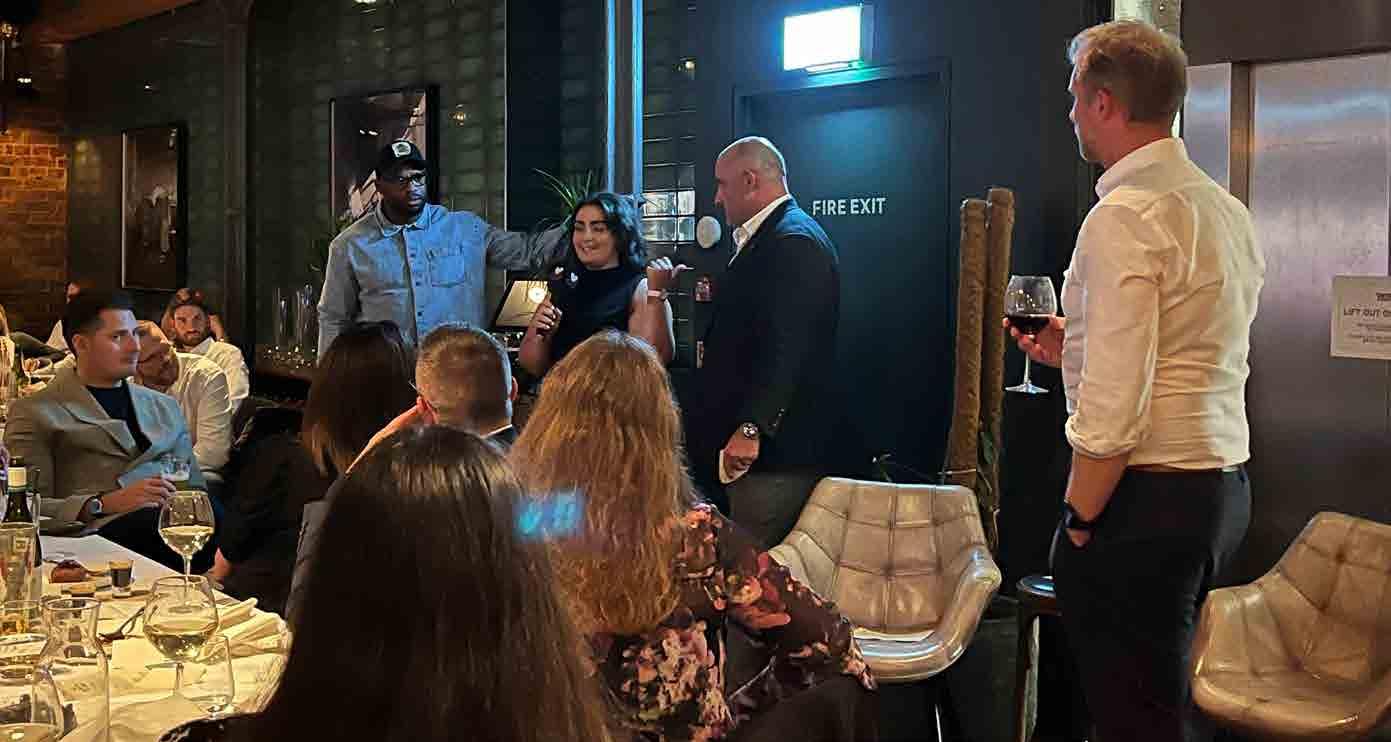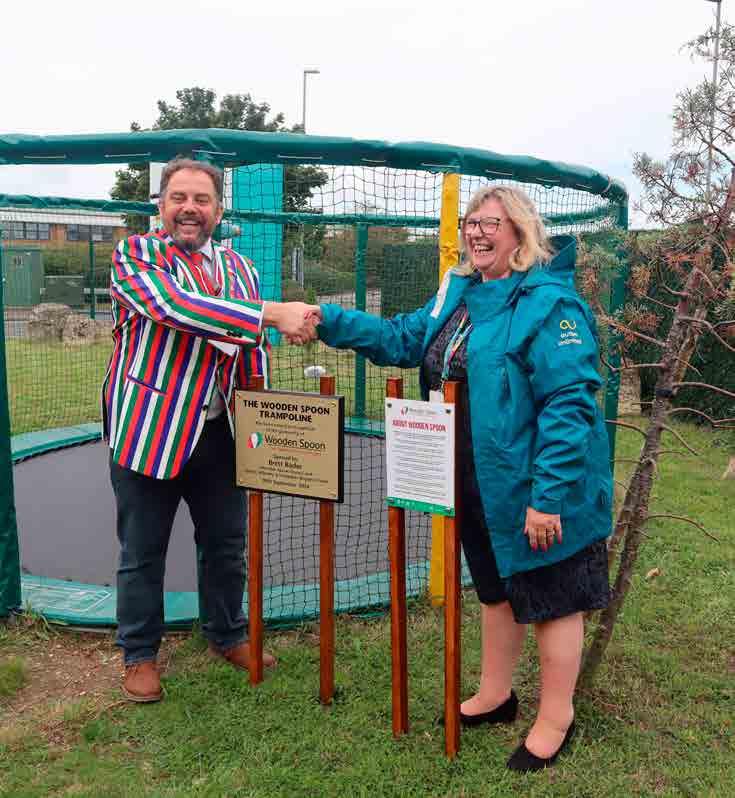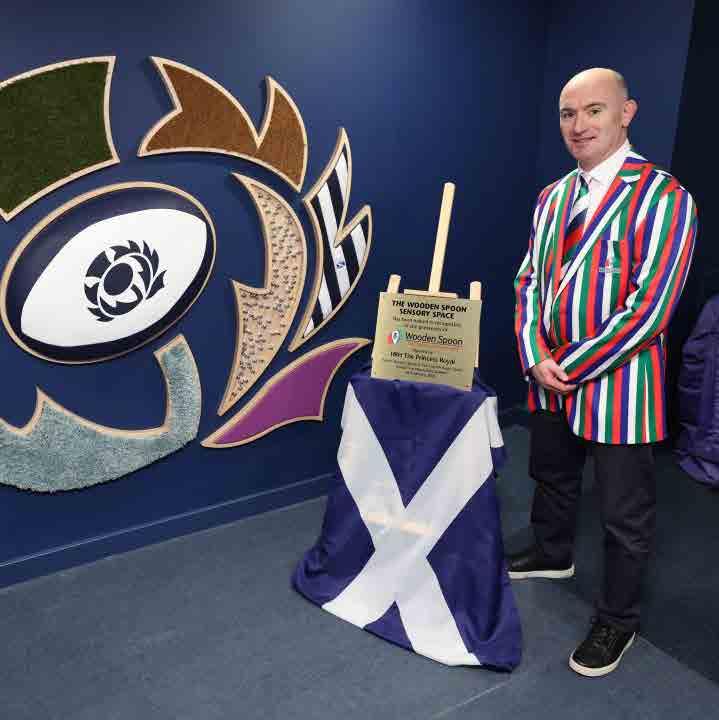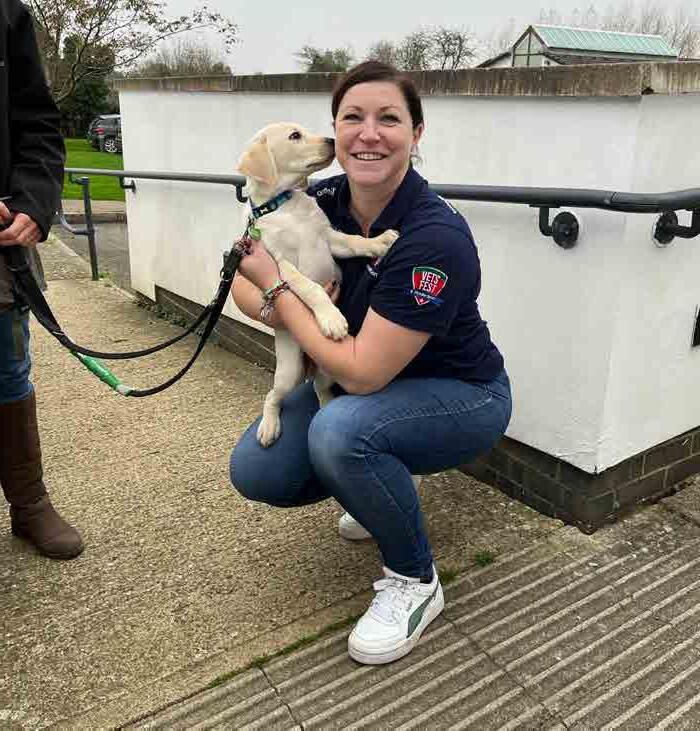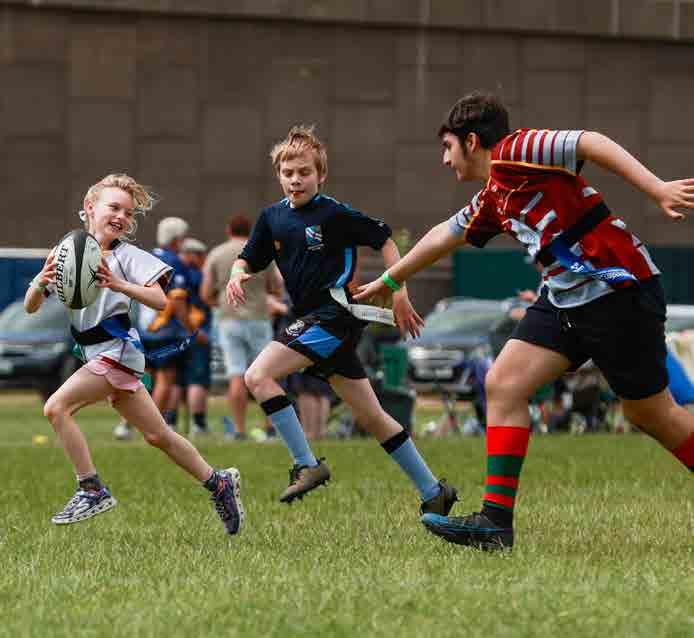

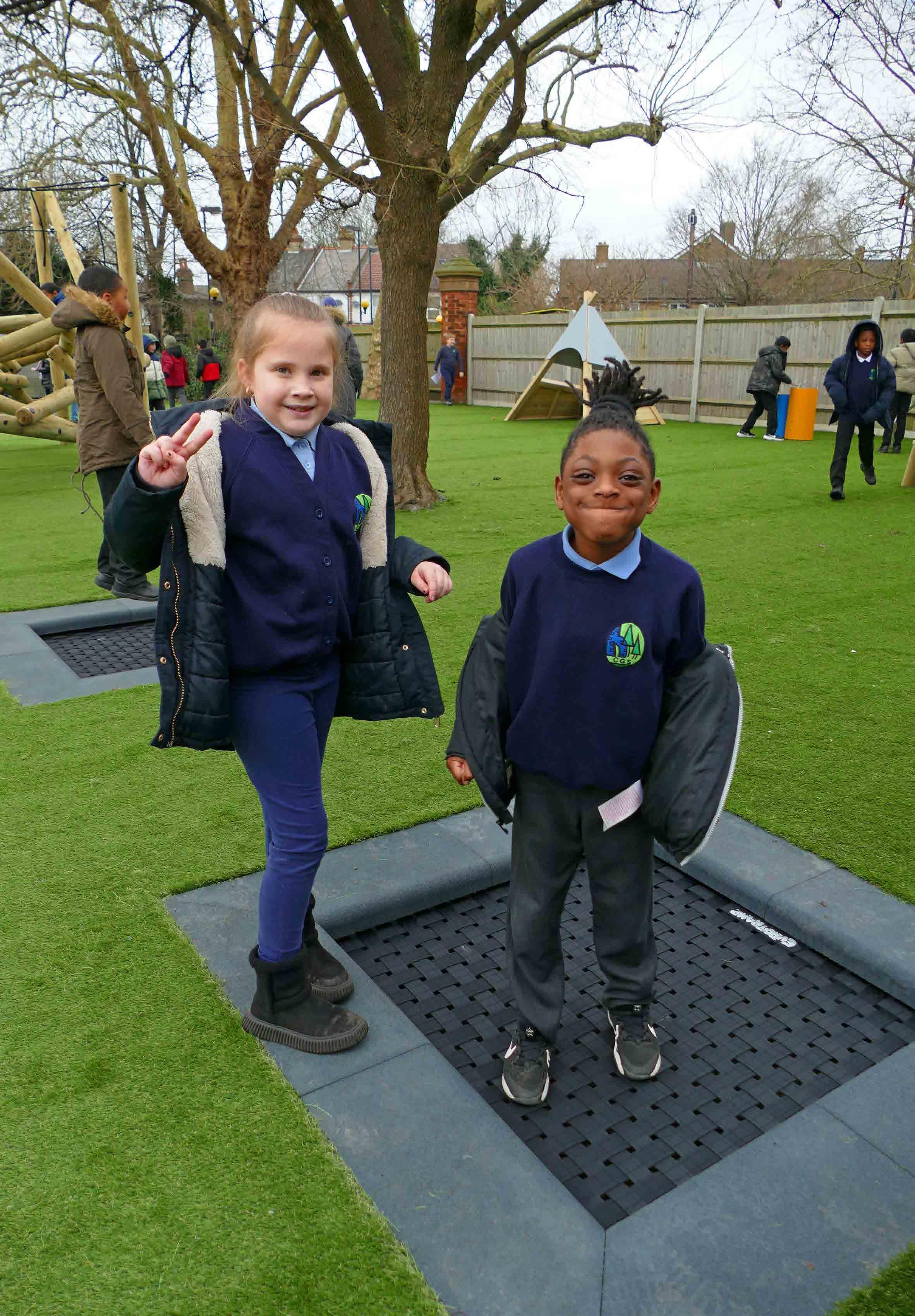
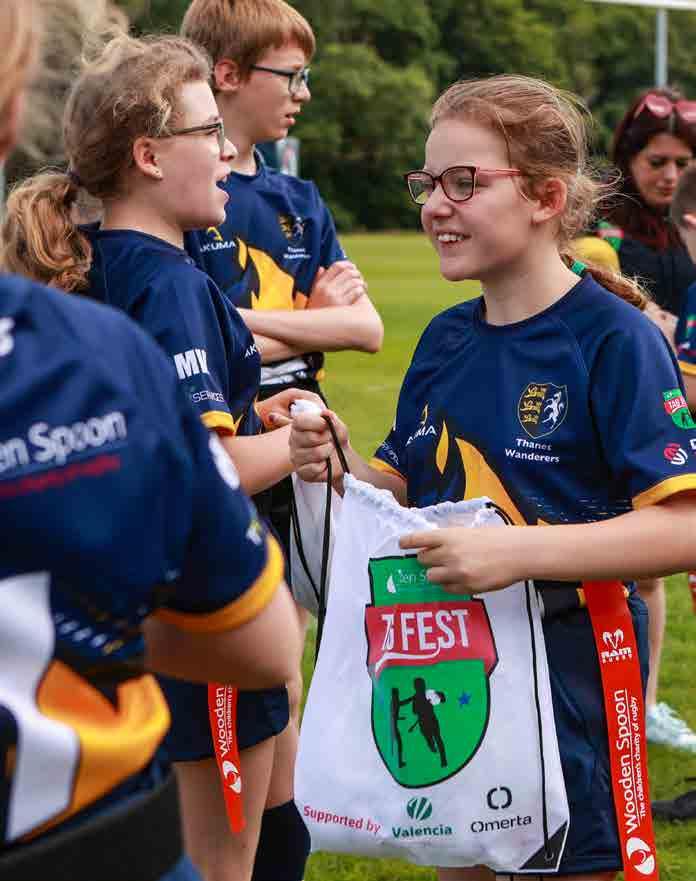










We have a dedicated and experienced Board of Trustees, with broad professional and commercial expertise, whose guidance, creativity and oversight have been vital.”
This year marks an important milestone for Wooden Spoon as we breathe life into a five year strategic plan for growth and development. It was heralded in last year’s annual report and we have made strong progress over the past 12 months establishing the scale of need, planning, resourcing and embarking on action in the key areas of income generation, support for beneficiaries, community engagement and governance. Detail is in this Report.
Across the UK and Ireland, we continue to see inspiring organisations, and community-led initiatives, applying for Wooden Spoon grants. It is a testament to Wooden Spoon’s success and profile but for every ten applications we receive, currently, we are only able to fund one. Each application is based upon a powerful idea, a pressing local need and the potential for real change. We are determined to meet the need for many more projects by scaling up: raising more funds, forging stronger/ wider partnerships, resourcing appropriately and investing in the systems, and people, that will drive sustainable change.
We have a dedicated and experienced Board of Trustees, with broad professional and commercial expertise, whose guidance, creativity and oversight have been vital. Their input ensures that our work remains focused, accountable and aligned with our long-term goals. Their commitment and energy play a key role in driving our mission forward.
Wooden Spoon’s highly motivated and tireless executive teams have embraced the challenge. The charity continues to rely upon its devoted volunteers, members, supporters and partners who share Wooden Spoon’s vision and values. The challenge for growth is underpinned by a collective and collaborative effort to deliver even more communities get the help they need.
Hope you enjoy the report. Visit the website for further information. Feel free to comment and please join in!

Quentin Smith, Chairman Wooden Spoon

Together, we are building a more inclusive future for children and young people through the power of rugby. Thank you for being part of this incredible journey.”
It is a privilege to lead Wooden Spoon, the children’s charity of rugby, and I am incredibly proud of the impact we have made together over the past year. At the heart of everything we do are our dedicated volunteers and donors, whose passion and commitment continue to drive meaningful change. I would like to thank each and every one of them for their unwavering support.
This year has been a step forward in our mission. As part of our commitment to making rugby and live sport more inclusive, we have funded sensory rooms at Allianz Stadium and Murrayfield Stadium, ensuring that children and young people with neurodiversity can experience the thrill of live matches in a supportive environment, opening the entire experience up to many families who would never get to attend a game at a stadium without this provision. This milestone exemplifies our dedication to breaking down barriers and ensuring rugby is a sport for all.
We also proudly marked our first-ever National Wooden Spoon Day on 19th March, and it was truly inspiring to see our social media channels overflowing with love and support. This special day highlighted the incredible work of our volunteers, fundraisers, and beneficiaries, reinforcing the life-changing impact of our charity.
A further highlight of the year was Tag Fest, which shone a spotlight on some remarkable young people – many of whom may have previously been left on the sidelines. Events like this reinforce our belief that every child deserves the opportunity to thrive through sport.
As we continue to align all our efforts with our five-year strategy, we remain focused on delivering sustainable, impactful projects that transform young lives. Our partnership with The Lions Trust is a testament to this commitment, as we work alongside like-minded organisations that share our values.
Finally, I would like to express my appreciation to our all our corporate supporters and especially Young’s Pubs, whose extraordinary fundraising efforts have raised over £200,000 for Wooden Spoon. Their generosity and dedication are making a profound difference in the lives of so many young people.
Together, we are building a more inclusive future for children and young people through the power of rugby. Thank you for being part of this incredible journey.

Sarah
Webb, CEO Wooden Spoon
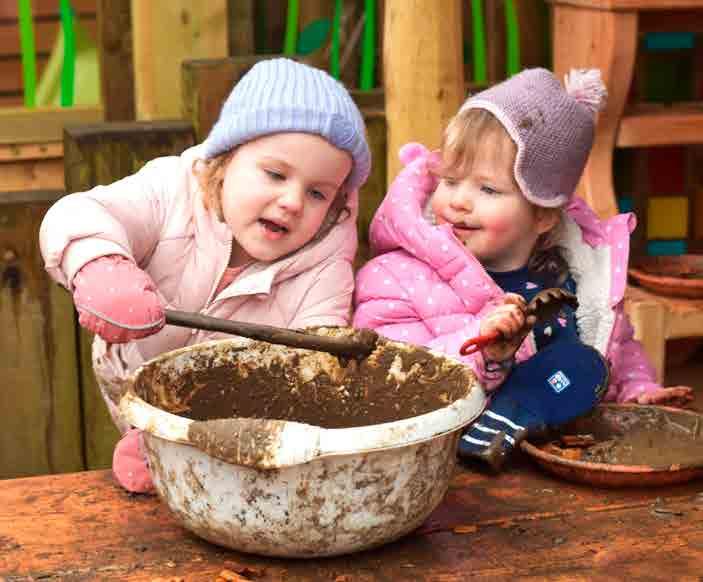
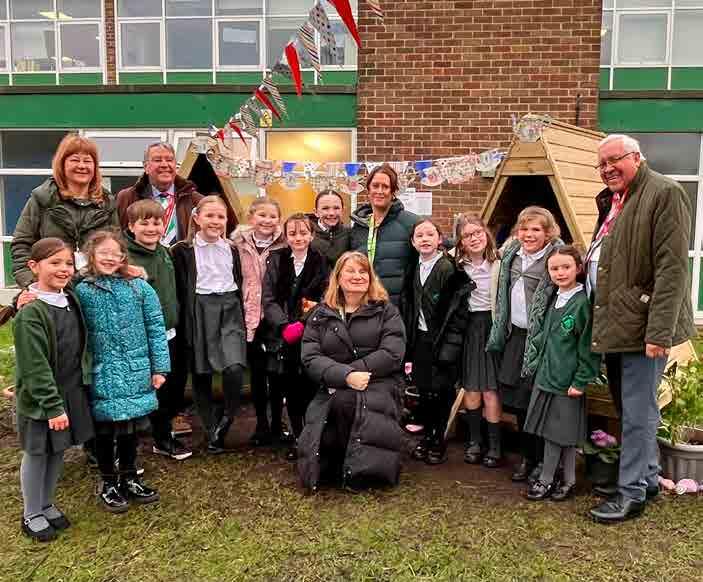
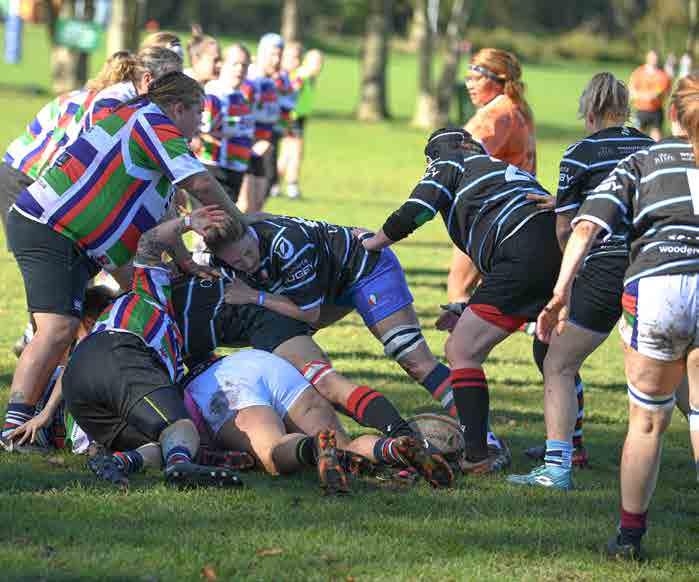
Through the power of rugby, every child and young person has access to the best life opportunities, no matter what their background.
To positively transform the lives of vulnerable children and young people through the power of rugby.
Fun Passion Teamwork Integrity
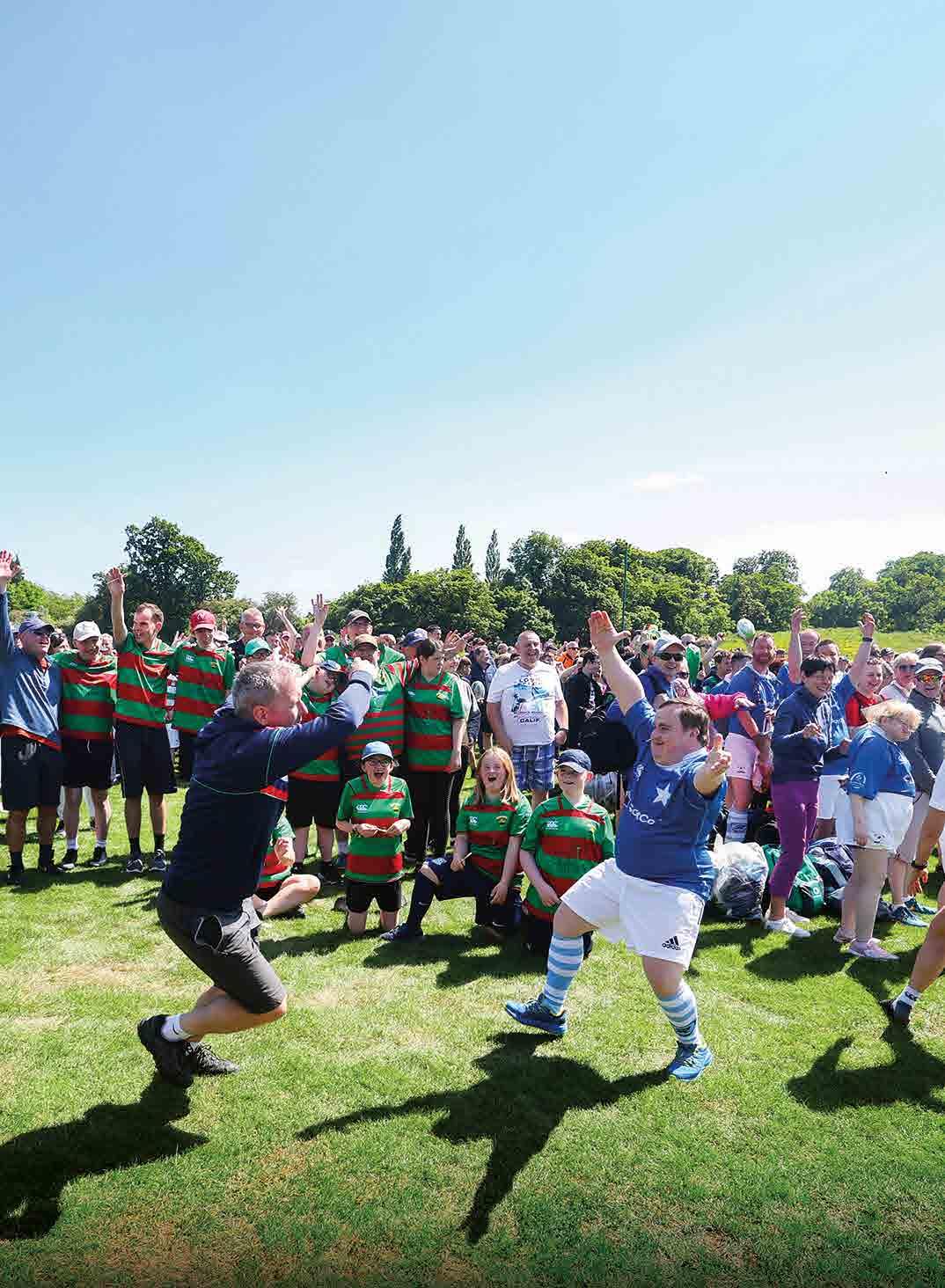
Wooden Spoon is a dynamic and impactful charity dedicated to transforming the lives of children and young people through the power of the rugby community.
We provide grants to local charities and organisations who work to give the best life opportunities to children and young people living with disabilities, those disadvantaged and those disengaged from society.
Our strategic vision is founded on three core pillars, each designed to advance our mission while being underpinned by a strong governance framework. This governance structure is not merely a support system but a fundamental component that enables us to equip our staff, volunteers, and grant recipients with the most effective tools and systems. It also ensures that our financial operations are conducted with the highest standards of transparency, excellence, and efficiency.
This comprehensive approach underscores our commitment to creating a meaningful and lasting impact on the lives of young people through the transformative power of rugby. Looking ahead, we remain confident that, with the continued support of our members, donors, and volunteers, we will achieve our ambitious objectives and further strengthen our reach and influence.

Together, we are making a lasting difference through rugby.
Looking Back:
Implemented SalesForce Marketing Cloud to enhance membership database management and communication.
Launched online Expression of Wish grant application process to streamline access and efficiency.
Aligned governance board papers with strategic priorities for improved clarity and oversight.
Increased volunteer engagement through:
• Live Team Talk webinars.
• Regular updates and communications.
Looking Ahead:
Continue refining membership management using advanced tools.
Launch a volunteer recognition programme to celebrate their contributions.
Explore added benefits for staff, including training and development opportunities.
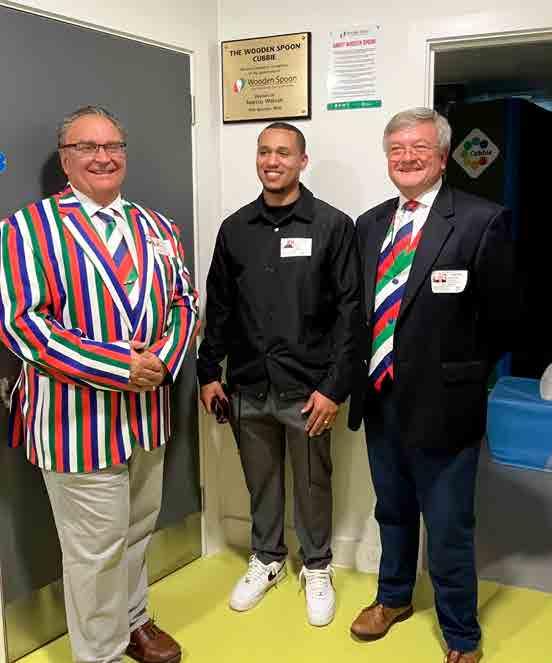
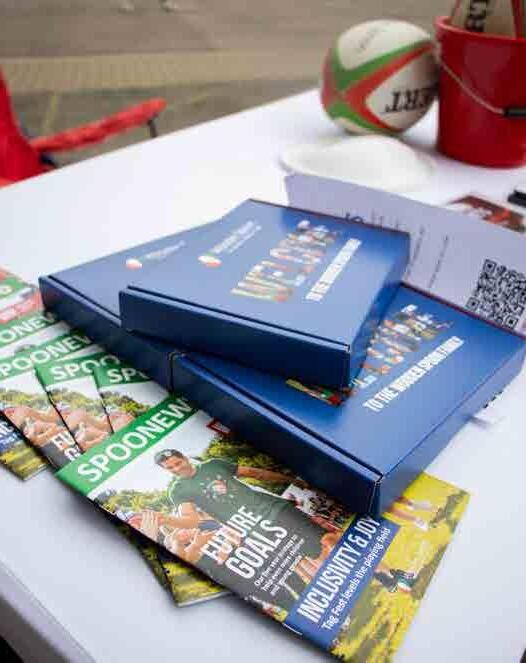

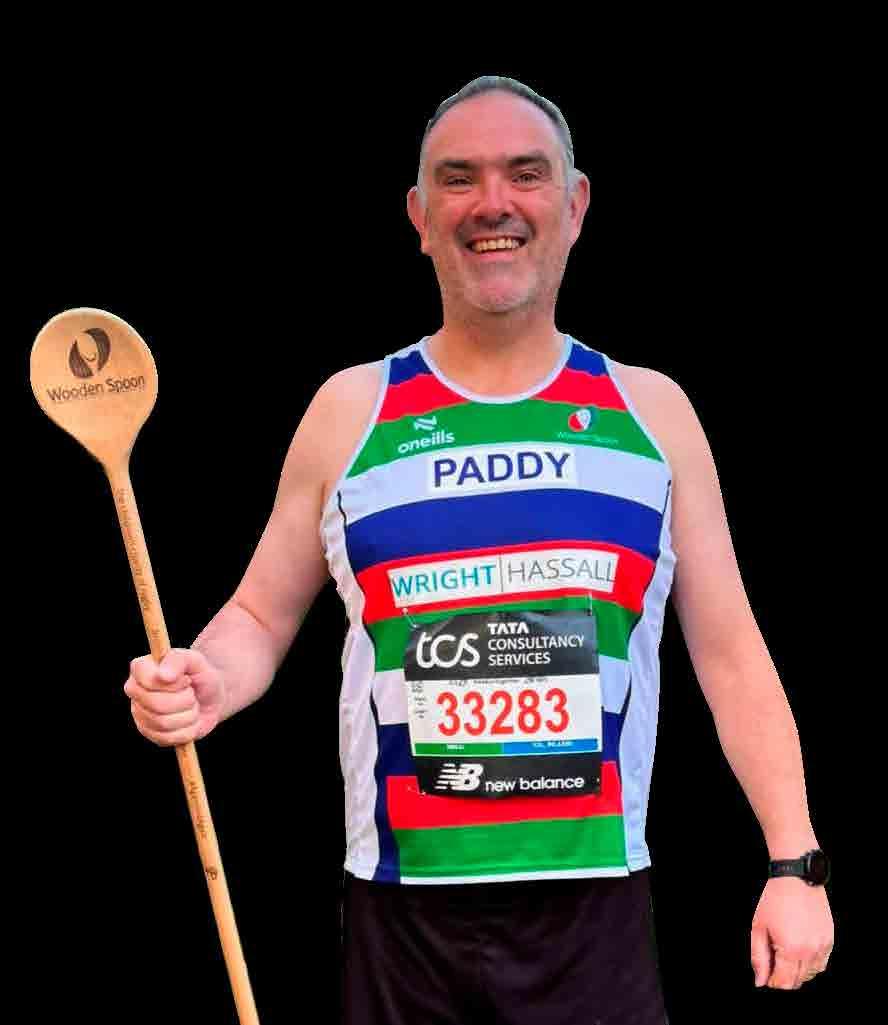
Looking Back:
Appointed a dedicated Individual Giving Officer to support regular donors and fundraisers.
Introduced a membership box to increase member value and engagement.
Launched a new challenge series to offer diverse fundraising opportunities.
Recruited a Head of Corporate Partnerships to strengthen existing partnership and dive new business development
Looking Ahead:
Implement an uplift in monthly membership donations (first increase in 6 years).
Launch a Legacy Campaign to promote long-term giving.
Develop a strategy to attract new corporate partners and identify more major donors
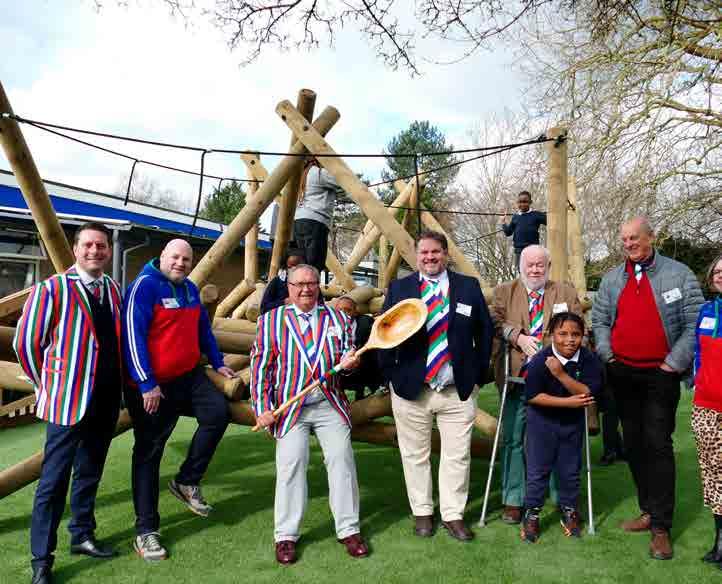
Looking Back:

Looking Back:
Gained deeper insight into the emerging needs of young people, particularly around mental health.
Surpassed last year’s project spend, enabling greater reach and impact.
Looking Ahead:
Continue sourcing and supporting impactful projects aligned with evolving needs.
Commit to transparent reporting on project outcomes and societal impact.
Continued our partnership with the Lions Trust Charity Partner, leading to collaboration with LooseHeadz on:
• The Longest Game – a Guinness World Record rugby fundraiser. Held the first-ever National Wooden Spoon Day, uniting supporters and beneficiaries online.
Strengthened partnerships and community engagement through:
• Tag Fest featuring ambassador Jodie Ounsley.
• New partnership with the Inter-Services Championship to engage Armed Forces audiences.
Looking Ahead:
Deepen engagement with partner and grassroots rugby clubs to expand community reach.
Build relationships with schools and educational institutions to:
• Promote awareness of our mission.
• Encourage youth-led fundraising efforts.
“Tag Fest shone a spotlight on some remarkable young people – many of whom may have previously been left on the sidelines.”

CHILDREN IN THE UK ARE NEURODIVERGENT *
Wooden Spoon has funded over 100 sensory spaces across the UK and Ireland, totalling over £4.6 million helping over 202,000 beneficiaries.



CHILDREN WITH DISABILITIES DON’T PLAY SPORT AT SCHOOL*
The Wooden Spoon International tag rugby festival (Tag Fest) gives players with mild and severe learning difficulties the opportunity to be a rugby player.
CHILDREN HAVE A MENTAL HEALTH ISSUE*
Wooden Spoon supports The Wave Project that enhances confidence, reduces isolation and increases the wellbeing of young people through surf therapy.
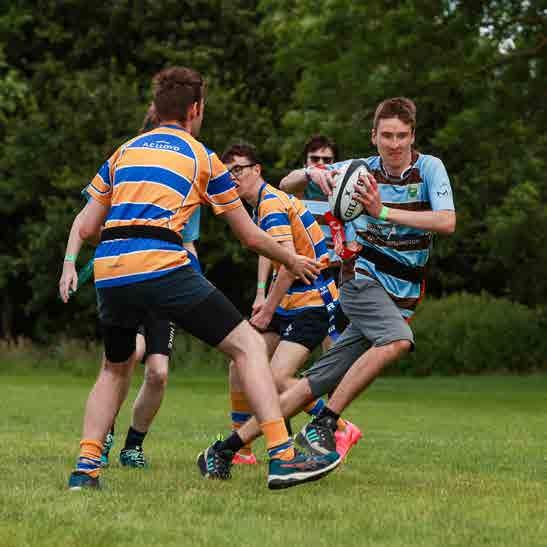
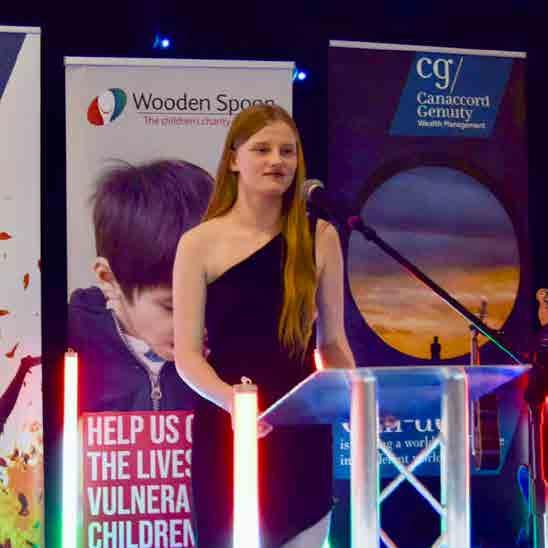
LIVE IN POVERTY*
Wooden Spoon supports The Boathouse Youth in Blackpool who work with children and young people from socio-economically deprived communities, to help tackle the challenges they’re experiencing


PROJECTS IN
30 REGIONS

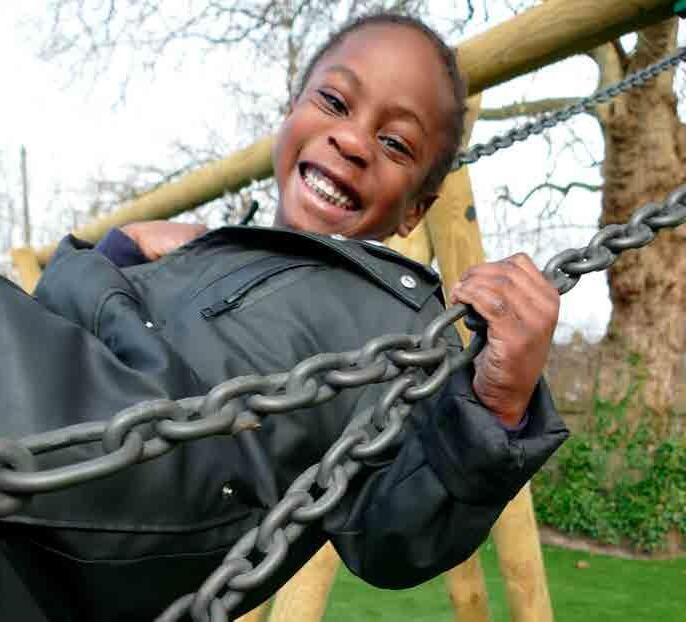
Looking ahead, we remain confident that, with the continued support of our members, donors, and volunteers, we will achieve our ambitious objectives and further strengthen our reach and influence.”
WE HAVE SUPPORTED
239,645 CHILDREN
£1.5 MILLION APPROVED FOR PROJECTS*
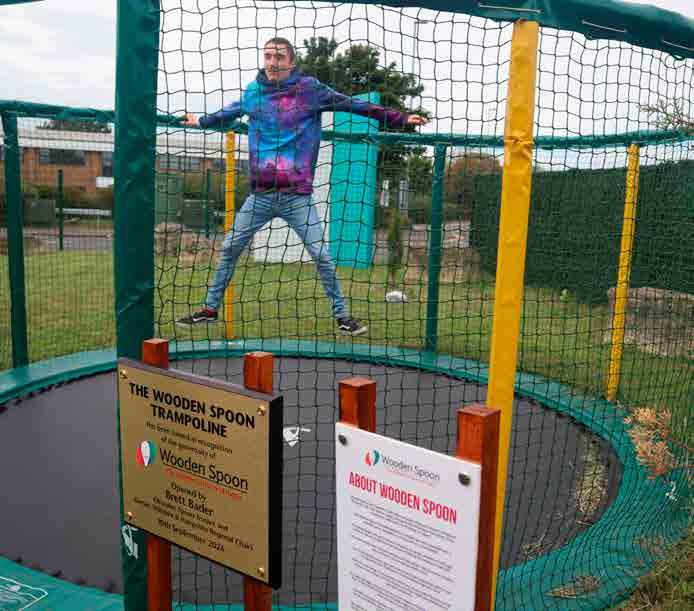
£1,804,807
RAISED BY OUR REGIONAL VOLUNTEERS



£222,495 RAISED BY YOUNG’S PUBS
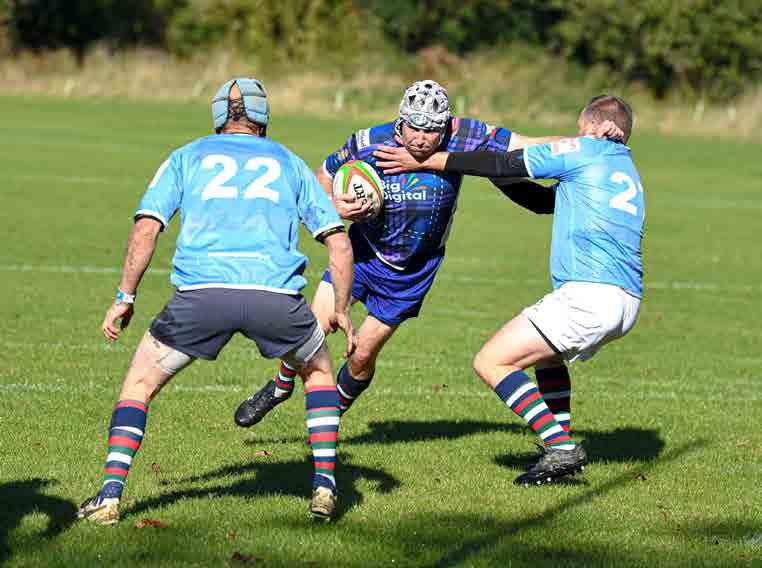
£97,621

£86,535 RAISED AT THE 2024 LONDON MARATHON
RAISED AT VETS FEST 24
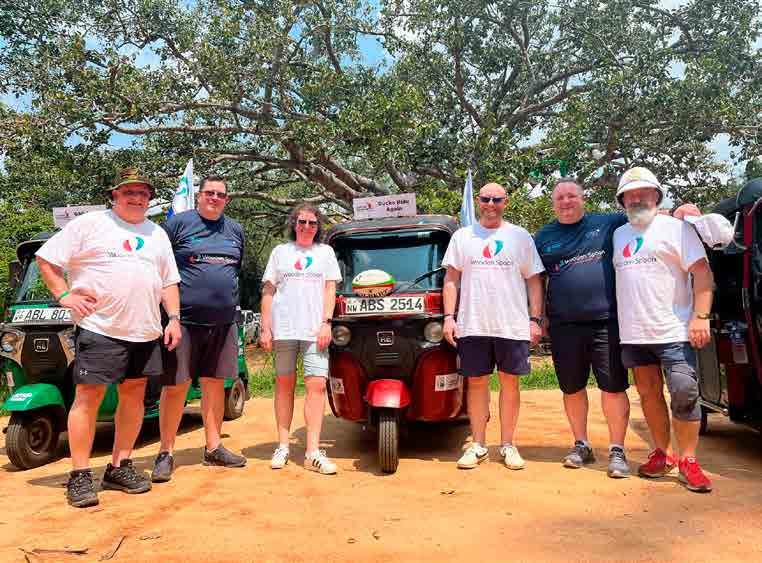
£18,000 RAISED BY THE TUK TUK CHALLENGE
Our corporate and rugby supporters have helped us raise our profile and go above and beyond with our fundraising enabling us to support more children who need our help.
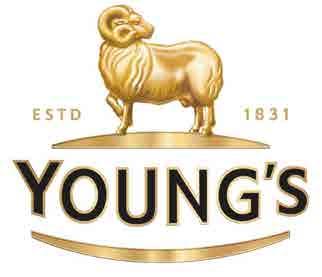
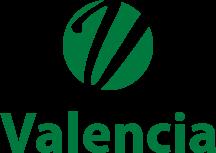



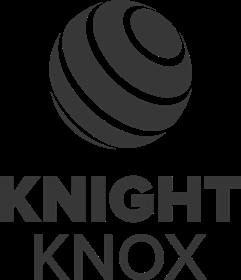
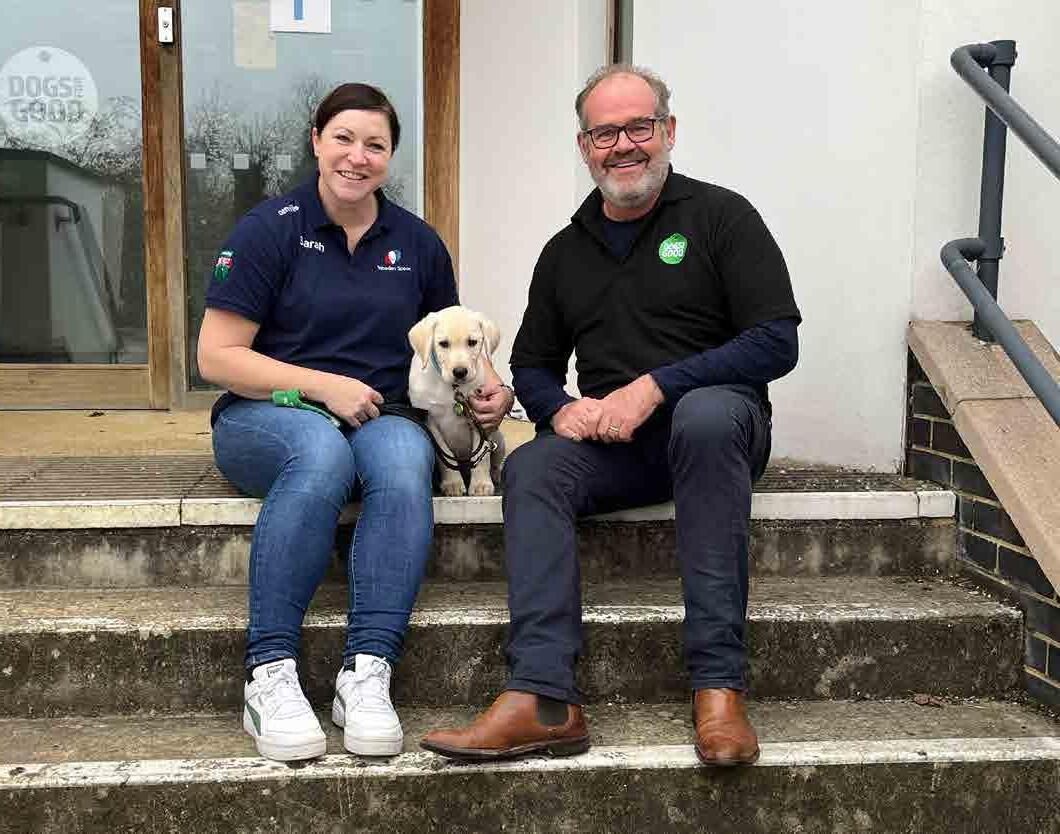

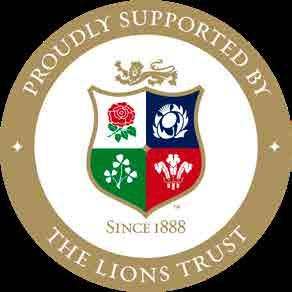



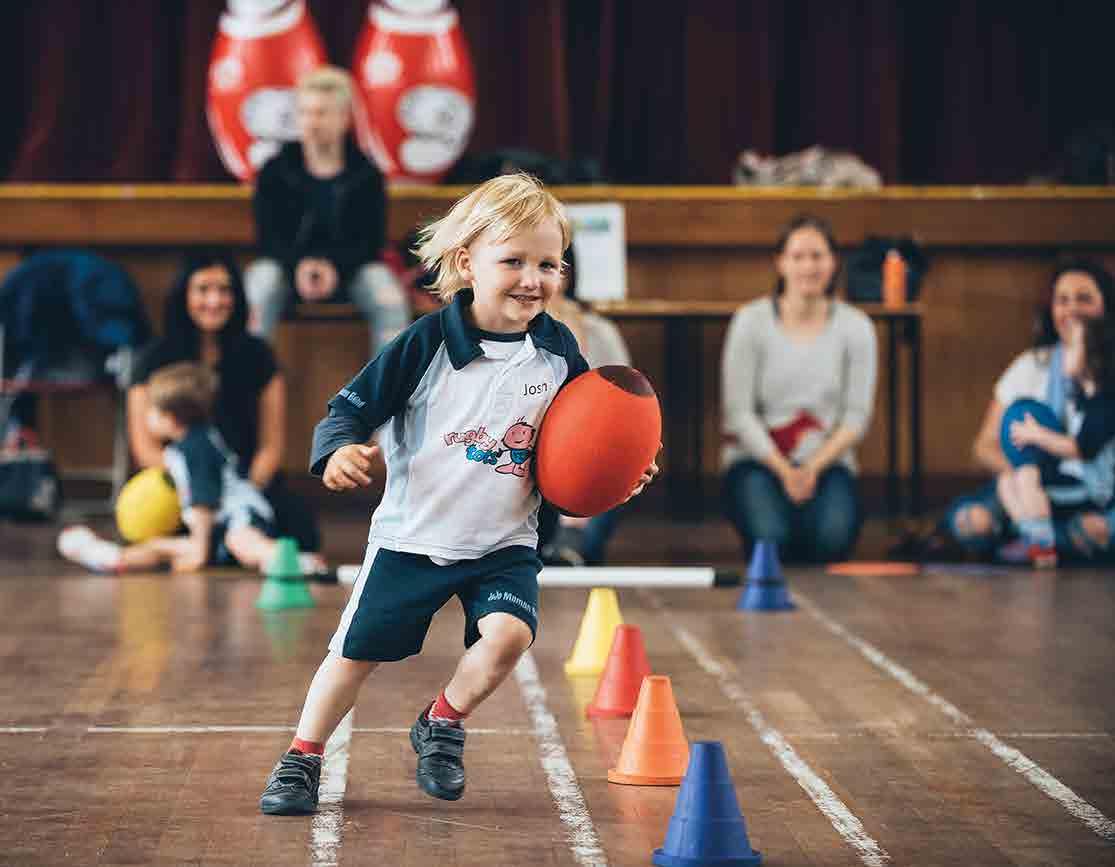

Wooden Spoon allocates funds to support its charitable mission: “Our objective is to positively impact the lives of children and young people through our dedication to high-quality charitable initiatives.”
To qualify for funding, projects must aim to enhance and support the lives of children and young people (under 25 years old or those with a cognitive age under 25) who face physical, mental, or social challenges.
Eligible projects must directly engage with children and young people, offering activities or services that positively influence their lives. Beneficiaries of the grant should be located in the UK or Ireland.
Organisations seeking funding must demonstrate the implementation of policies that safeguard and promote the well-being and development of children and young people in their care. Additionally, proof of financial stability is required.
All projects must agree to provide clear information on the impact of the grant two and five years after completion, ensuring transparency and accountability.


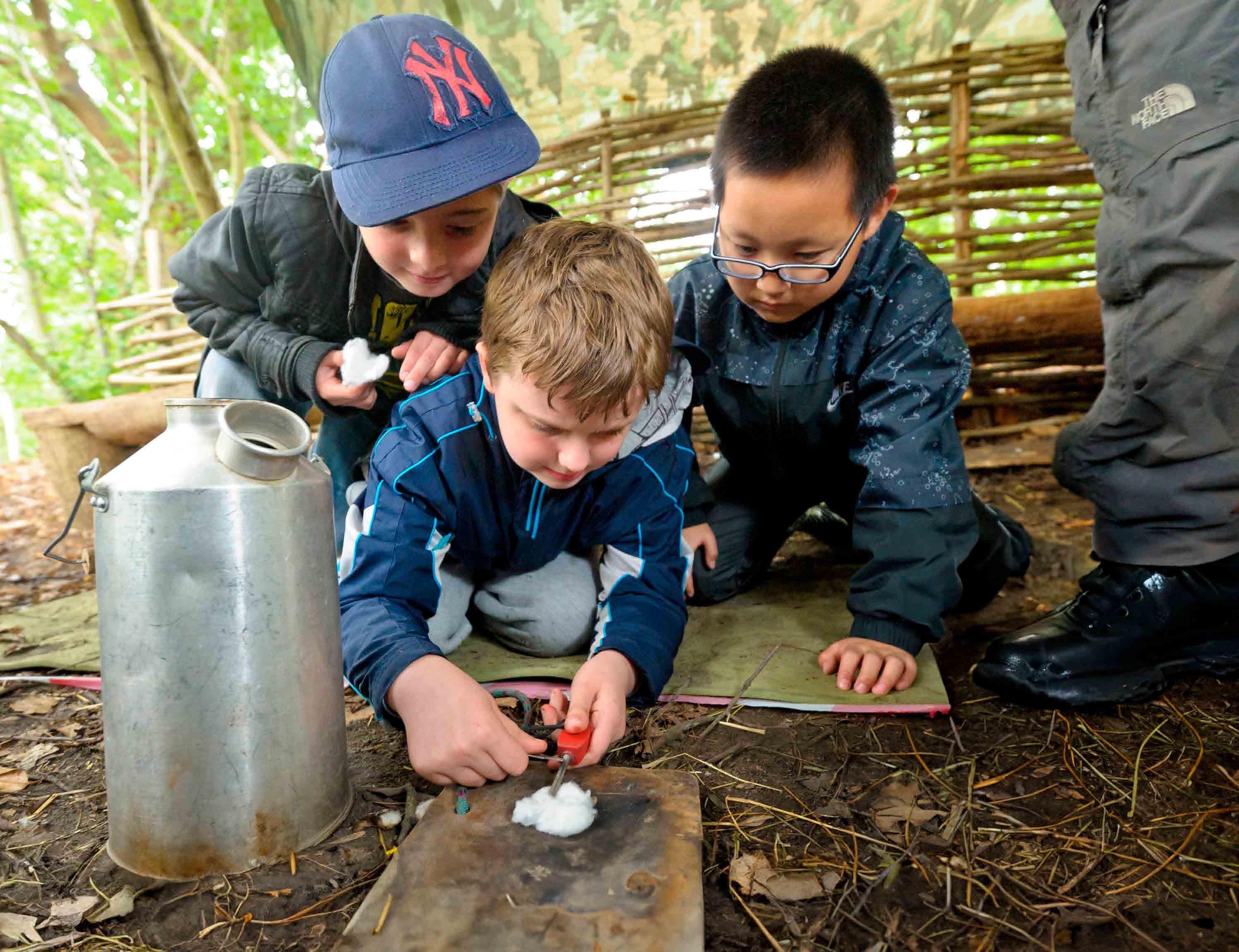
Through the power of rugby, every child and young person has access to the best life opportunities, no matter what their background.”
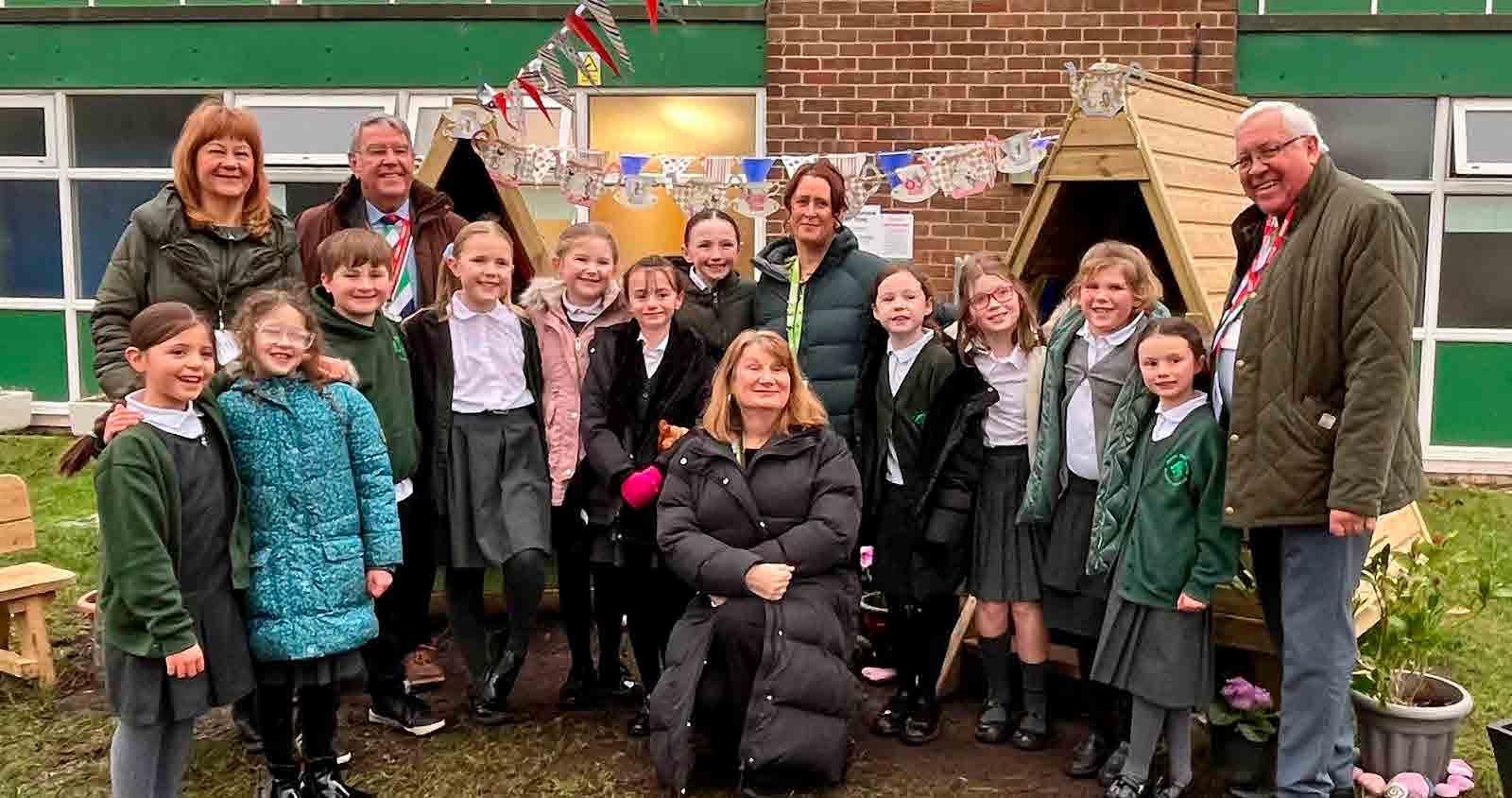
Age range
The chart below shows project approved by value in 2025:

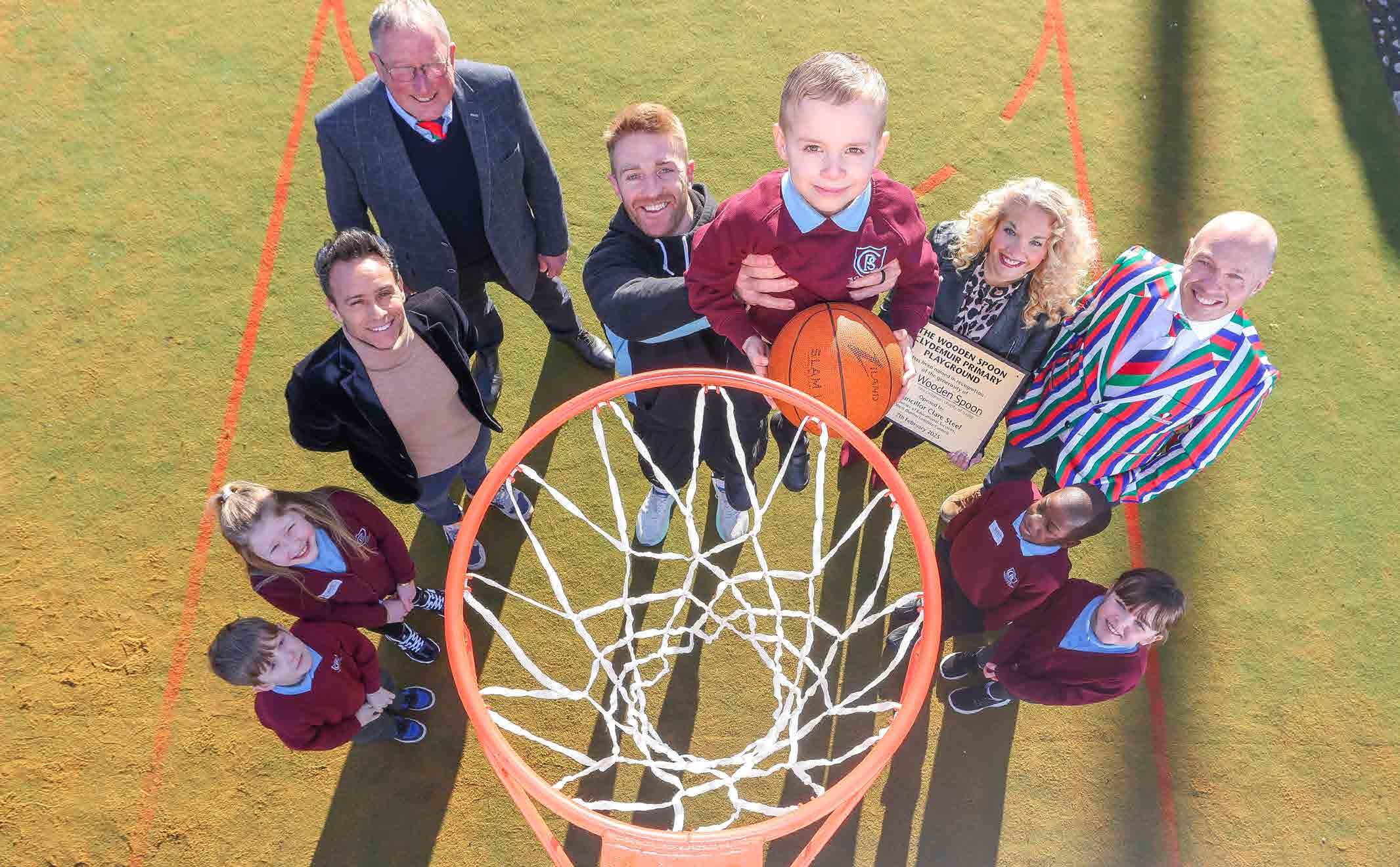
Health & Wellbeing projects approved by age range (years)
We believe no child should miss out on the health and wellbeing benefits of sport. 0–4 years
& Wellbeing projects approved by conditions supported
TAG FEST | GRANT AWARDED £55,000 | NATIONAL
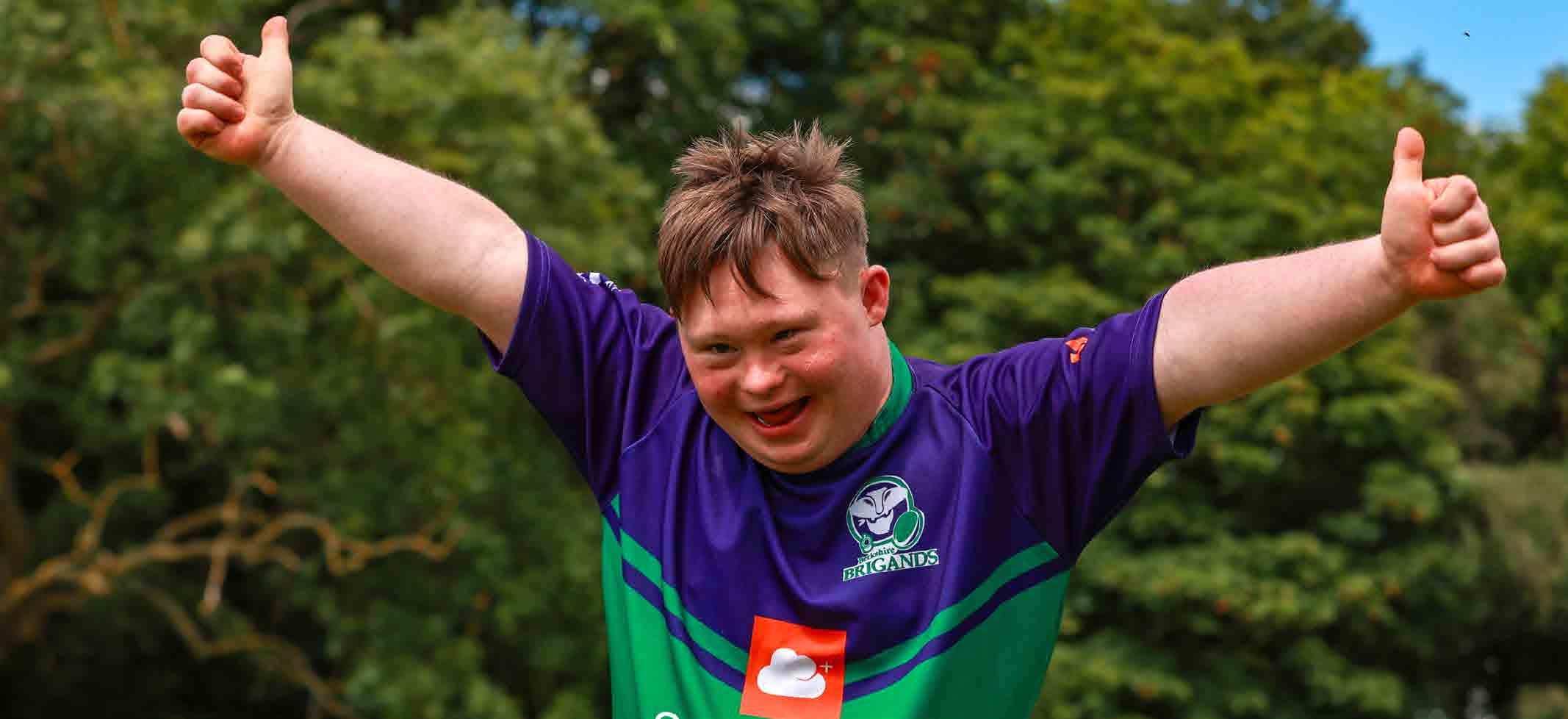
There was an atmosphere of joy and inclusivity at Broadstreet RFC, in Coventry, as the Wooden Spoon International Tag Festival kicked off for a rugby-packed day full of team spirit.
Supported by rugby star Jodie Ounsley, the festival marked the start of our broader initiative to expand the disability rugby scene across the UK and Ireland.
Connor’s mum, Helene tells us what a difference Tag Fest has made to her son: “Connor feels like he doesn’t fit in at school and is used to being left out.
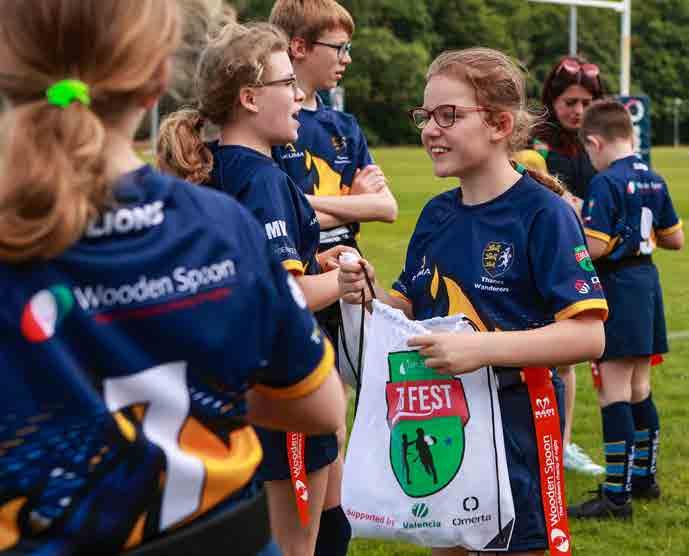
When I found out about Tag Fest I knew it was the perfect opportunity to help him feel like part of a team and I wasn’t wrong – but what I wasn’t aware of was how incredible an experience it would be.
“It was utterly heart-warming to see not tens, but hundreds of children, who might not otherwise get the opportunity to enjoy rugby, come together in mutual acceptance and harmony.
“It was a breath of fresh air to be in the company of others who don’t judge and understand the challenges that come with parenting a child with additional needs.
“Words can barely describe the feeling. What we have experienced at Tag Fest was a holiday for my soul and something I thought my son would never get the chance to do.
My son told me that he loves his life now. We feel like we are part of something very special.”
With 23 teams for Under and Over 15s with mild and severe learning disabilities, the festival was a tremendous success, bringing together players, families and supporters for a day celebrating the spirit of rugby and the power of inclusivity. Wooden Spoon Rugby Manager, Matt Mitchell, said:
“Tag Fest is a really joyful event focusing on building connections between individuals with different abilities who typically struggle with communication. They flourish when rugby is involved.”
We thank all our teams, volunteers and supporters including Omerta and Valencia Waste Management for making this incredible event happen.

We provide firm foundations for brighter futures by building and funding specialist facilities.
Specialist equipment & facilities projects approved by age range (years)
Specialist equipment & facilities projects approved by conditions supported
Speech and language 6%
Specific learning difficulties 8%
Visual impairment 2%
Hearing impairment 1%
Warmley Wheelers offers specialist equipment and a safe, friendly environment to support individuals who might otherwise find it challenging to ride a bike.
Wooden Spoon’s donation enabled the Wheelers to add a side-by-side tandem with an electric motor to their fleet of specially adapted bicycles.
Service Coordinator John Simmons explained the significance of the tandem: “The young people are sitting next to their carer. It’s a chance to exercise in a controlled and safe way, allowing everyone to explore as much as they can.”
The cycle scheme utilizes a 4km stretch of the Bristol to Bath railway path, as well as a quieter area in Warmley Forest Park, to bring the freedom of cycling to everyone, regardless of ability. John has observed the benefits riders experience from the tandem: “The bike allows them to put effort into the ride and gives riders a focused, positive experience that has benefits both during and after the ride.
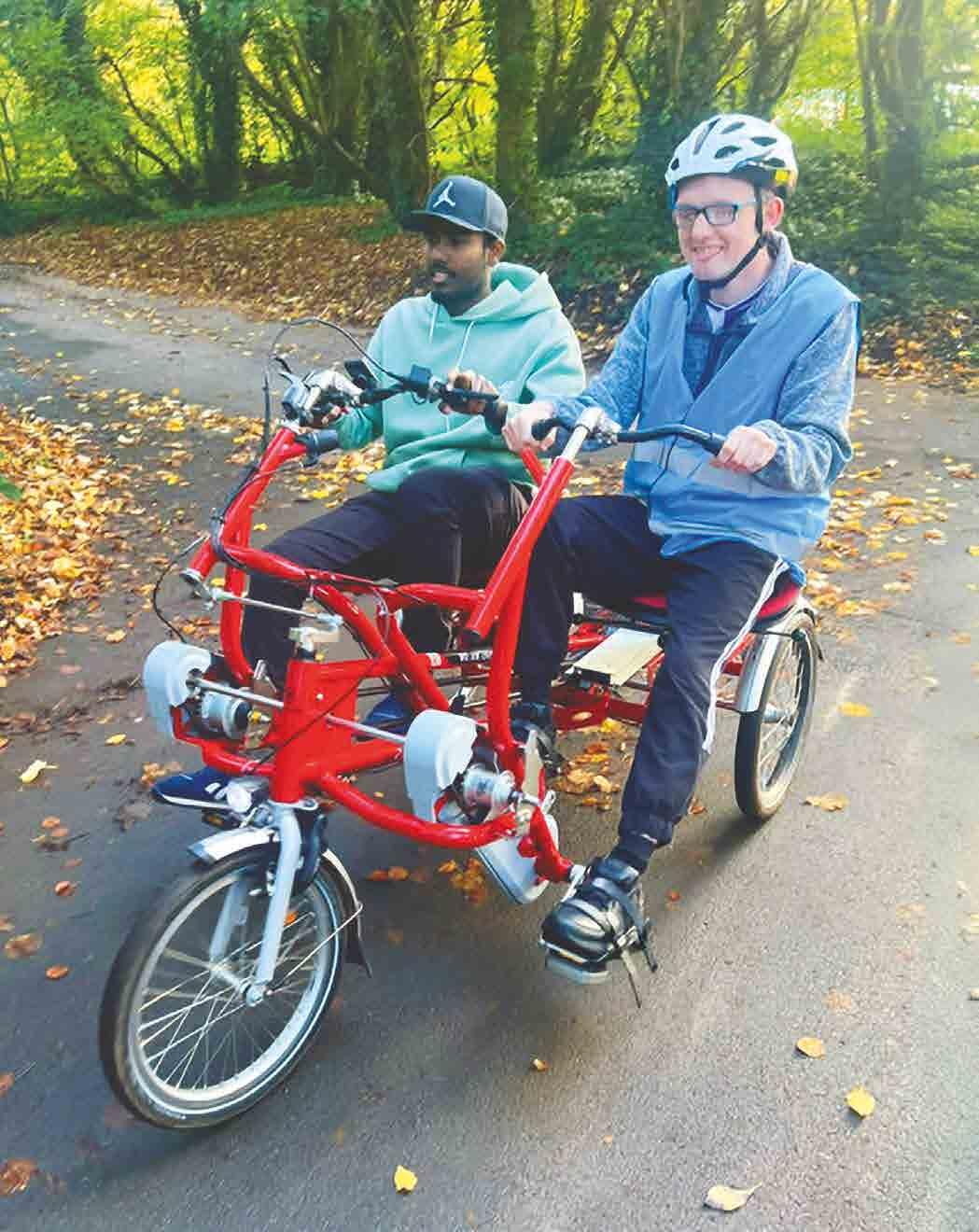
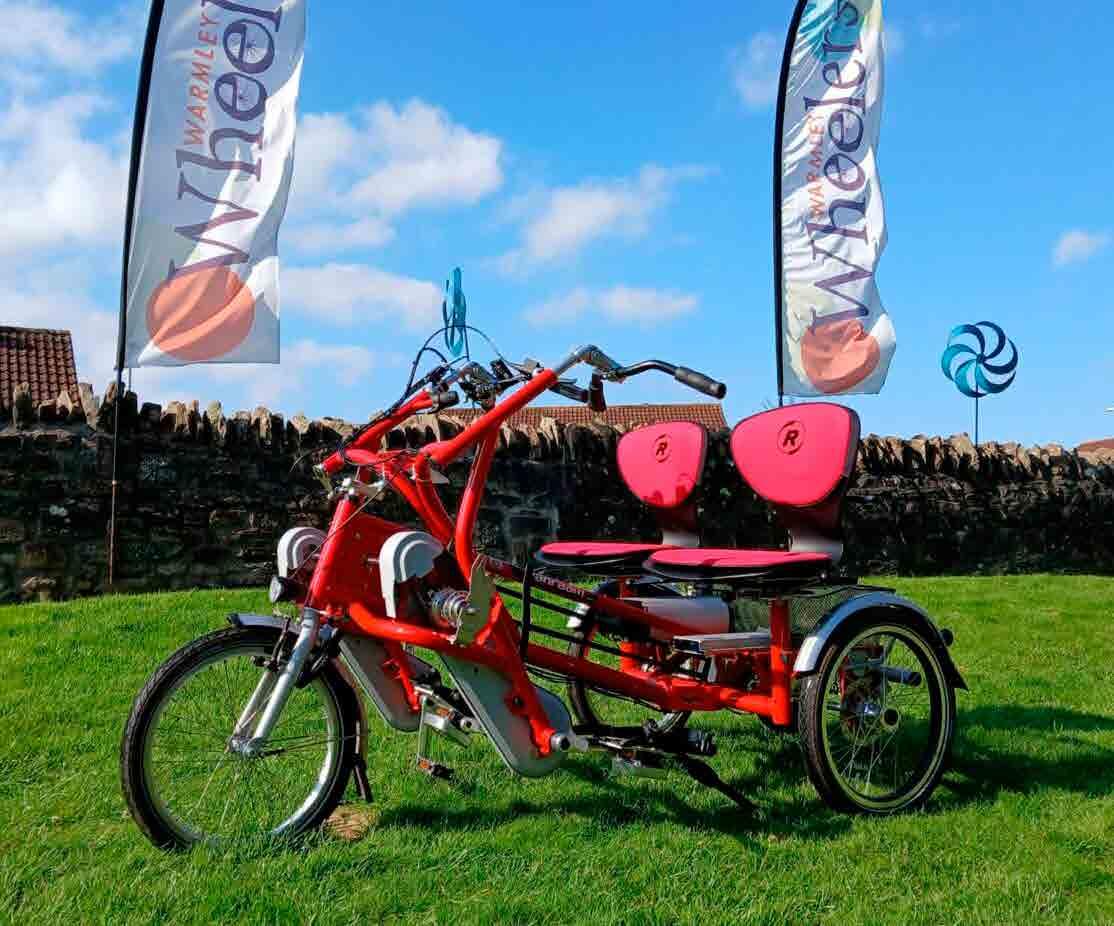
The new Vanraam tandem bike is the most used, most popular, and most requested of all the bikes we have.” The surrounding scenery enhances the experience, adds John: “It’s beautiful; there are trees and nature. It’s an old railway line, so there are a few tunnels. The tandem bike allows people to be out and about, watching the world go by and the seasons change. Some days it rains, some days it’s sunshine – it’s just nice to experience it all. It’s good for mental wellbeing.” The children and young people also have the opportunity to improve their cycling skills. “They might start with the Vanraam to get them moving and cycling. Then we progress them onto a solo trike and then onto a classic bicycle,” said John.
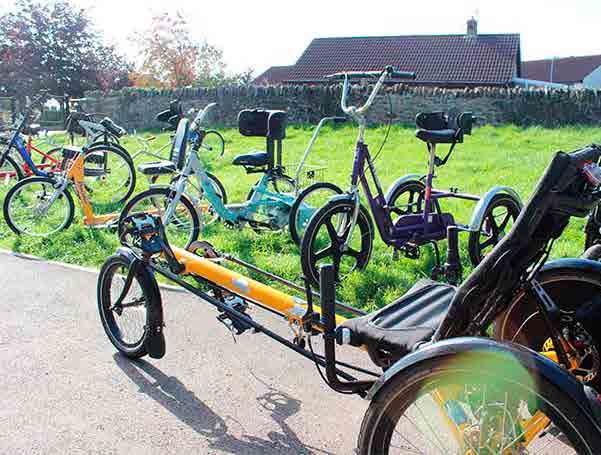
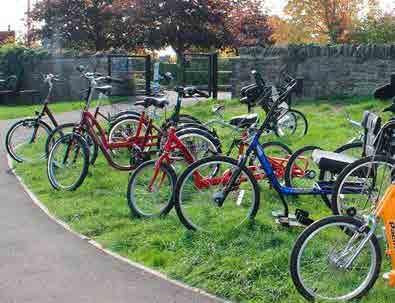

We aim to excite, engage and educate young minds by stimulating children’s senses.
Sensory Rooms and Gardens projects approved by age range (years)
Sensory Rooms and Gardens projects approved by conditions supported
Across the UK, a shortage of specialist school placements means that many children with autism miss out on the education they deserve.
Ambitious about Autism’s mission is to stand with autistic children and young people, champion their rights, and create opportunities. They provide expert autism education in their London-based schools and college, as well as offering wide-ranging support beyond the classroom.
Children and young people with autism often have difficulty processing information, which can lead to sensory overload and severe anxiety. Sensory regulation is not only important for the young person’s well-being but also enables them to learn. Wooden Spoon provided funds for a break-out space called The Cubbie, an immersive sensory experience.

The school is short of space, and The Cubbie offers a compact solution for pupils who need to regulate and reset away from others. Students have their own login with specific programmes. For example, if a child is interested in nature, their programme will have a nature theme.
The project was opened by rugby star Marcus Watson: “The Cubbie is awesome. I really like the idea; it’s going pretty well with the kids, which is great to hear.”
Executive Head Andy Nowak added: “We have children here who weren’t happy in their other school placements; mainstream school doesn’t work for them. We try to create a nurturing, inclusive environment, but we’re doing that in a building that wasn’t designed for us.” The Cubbie fits into a small space in the existing school. Andy continues: “We have lots of young people who use it for their everyday routine and regulation. The kids love it. It makes a difference every day of the week.”
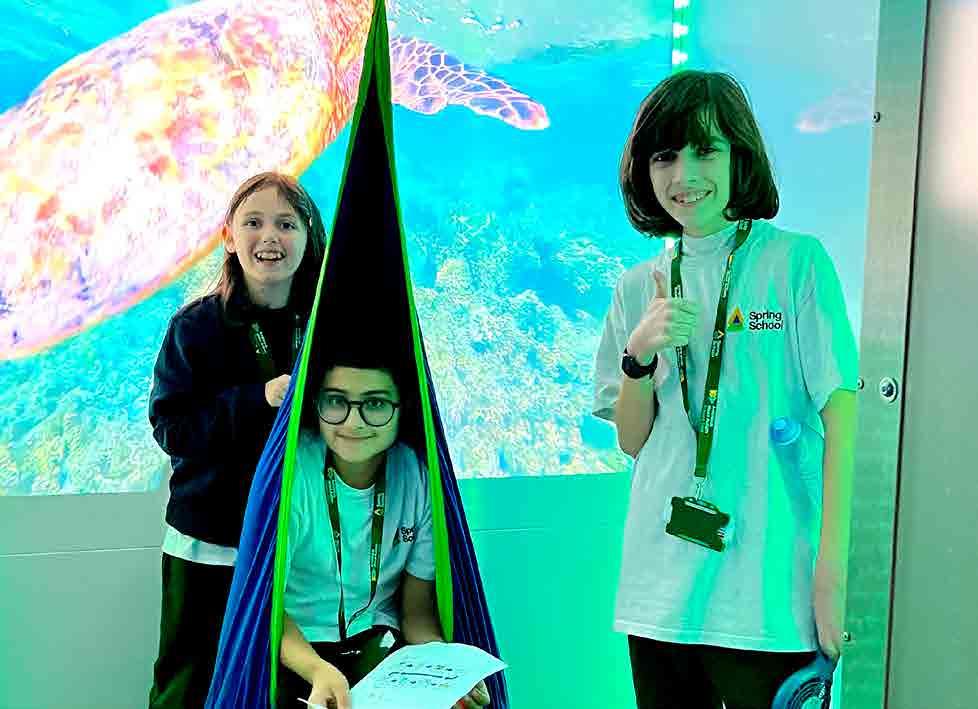


We value the power of play in learning new skills and in emotional development.
Playgrounds & Outdoor Activities approved by age range (years) Playgrounds & Outdoor Activities approved by conditions supported
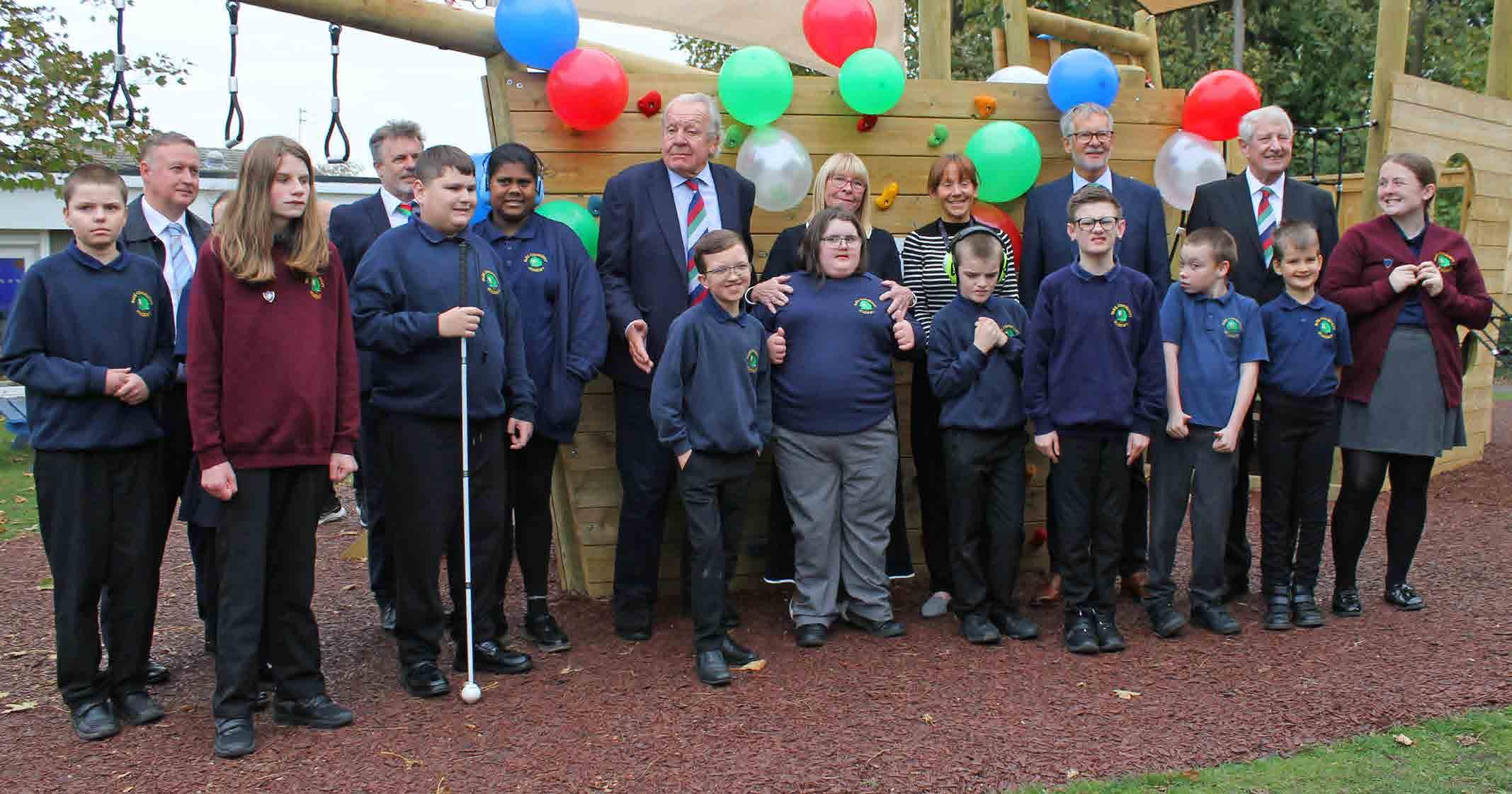
Sir Bill Beaumont took to the captain’s bridge to launch Park Community Academy’s new pirate ship, much to the delight of the school children.
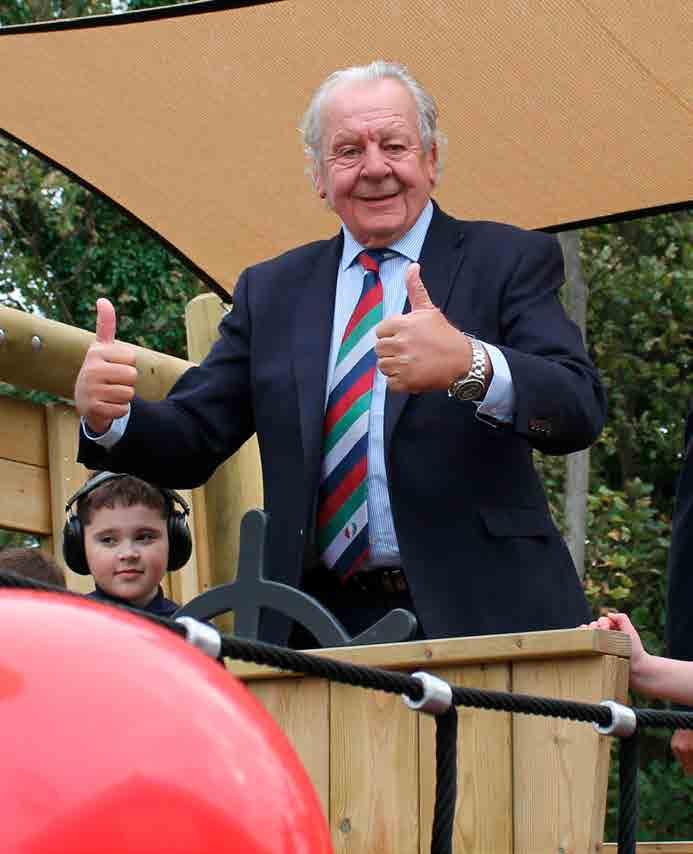
The school caters to a wide range of needs, including autism, Down syndrome, sensory needs, social, emotional, and mental health challenges, speech, language, and communication difficulties, and physical disabilities.
Funded by Wooden Spoon, the pirate ship will help pupils develop gross motor skills and further enhance their imagination and creativity.
Assistant Headteacher Ben Whittaker said: “The pirate ship climbing frame will give our pupils the opportunity to be active, play, and develop social skills both independently and with support. They love it already; it’s very popular.”
Ben has also observed that children who previously didn’t engage in traditional sports during breaks and lunchtimes are now using the pirate
ship – and, by being more active, are forming good life habits. With obesity rates in children rising, it is important for schools to ensure there are more opportunities for physical activity.
For the pupils, sensory and physical activities are also key to ensuring they can focus and succeed at their own level. Jensen, aged 11, has just started his second year at Park Community Academy. His mum, Catherine, explained: “Jensen can be boisterous. He also has epilepsy and needs monitoring. If Jensen bangs his head, there is a high possibility that he will have a seizure. Jensen now has opportunities for movement breaks when he needs to and is in a setting that is greater suited to meet his needs.”
Jensen added: “It’s amazing! The best climbing frame ever!”
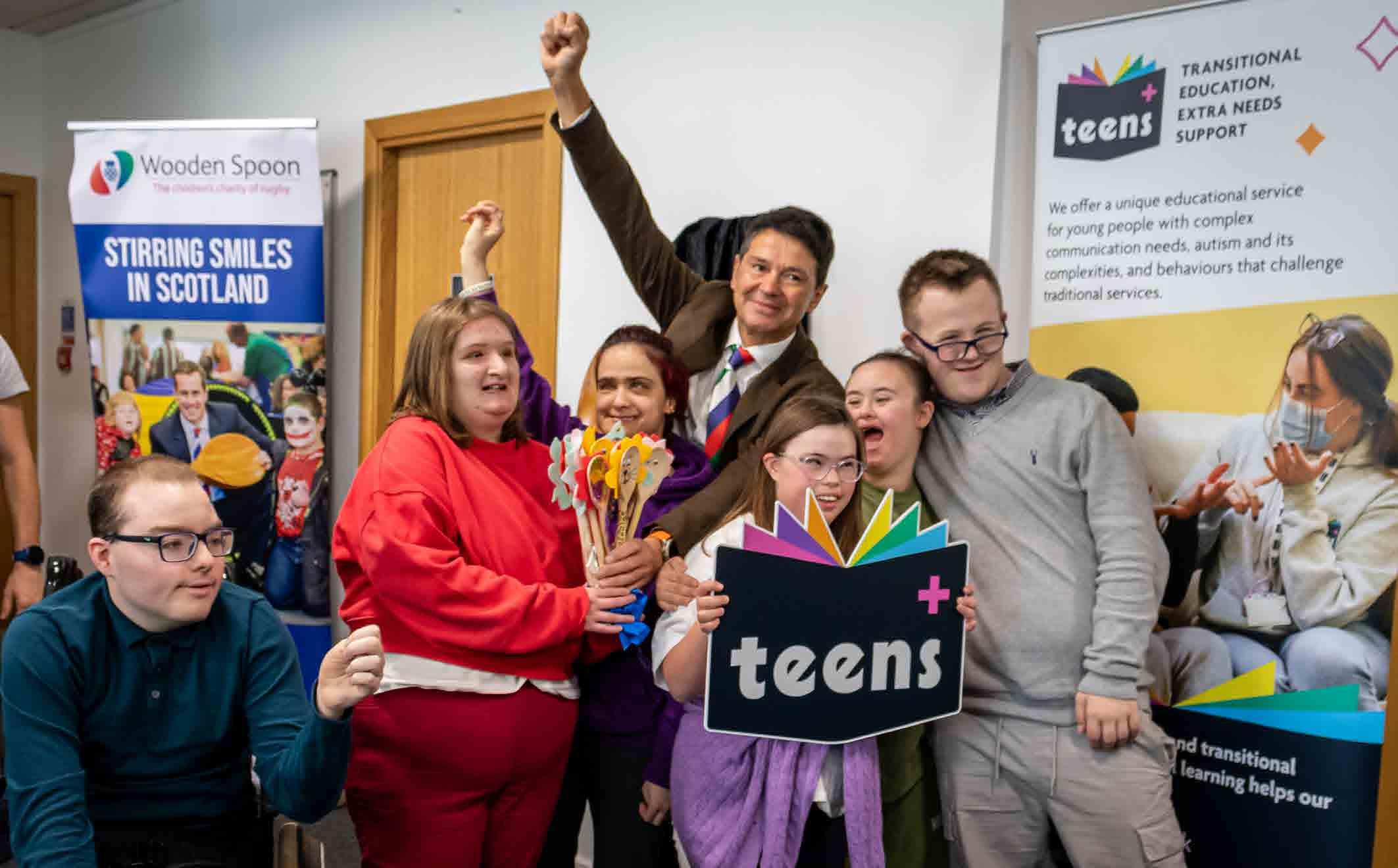
Engaging socially disadvantaged children and young people not in education, training or employment (NEET).
Education projects approved by age range (years)
Education projects approved by conditions supported
0–4 years 0%
5–11 years 0%
12–18 years 100%
19–25 years 0%
Deprived 0%
Emotional difficulties 0%
Intellectual disability 0%
Multiple disabilities 0%
Orthopaedic impairment 0%
Other health impairment 0%
Speech and language 0%
Specific learning difficulties 4%
Visual impairment 0%
Hearing impairment 0%
SoHK PROGRAMME | GRANT AWARDED £25,000 | NATIONAL
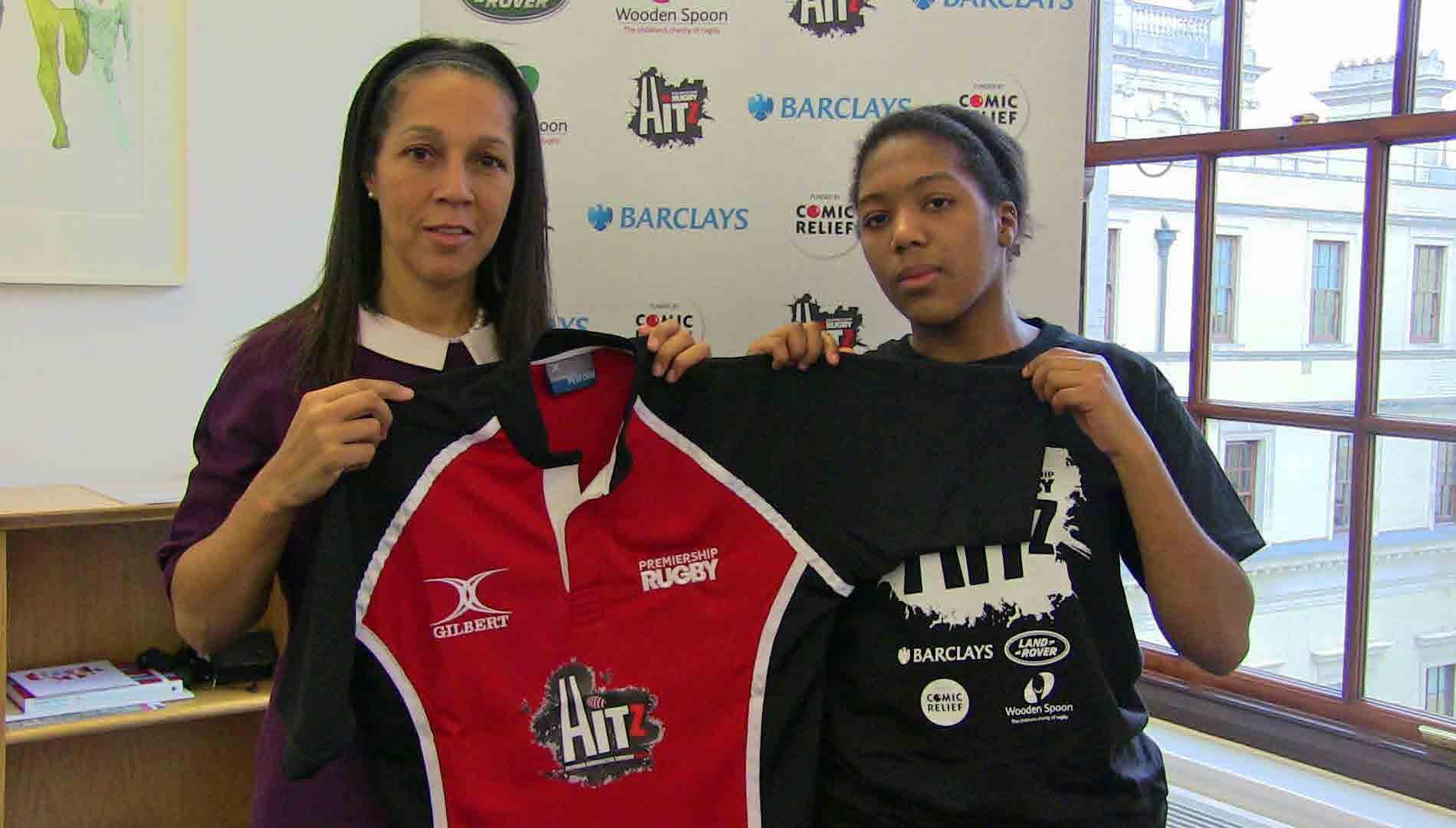
Freddie (name changed), a 15-year-old student, was referred to the School of Hard Knocks (SoHK) program due to persistent behavioural challenges, poor school attendance, and frequent internal exclusions. His disruptive attitude, lack of engagement in learning, and habitual lateness were significant concerns. Without a positive outlet or structured support, Freddie struggled to find motivation and direction in school.
Since joining SoHK, Freddie has made remarkable progress. The program has helped him improve his relationships with teachers and peers, manage his behaviour in the classroom, and increase his attendance—particularly on days when SoHK sessions were held. Through structured mentoring and the discipline of sport, Freddie has
developed a greater sense of responsibility and self-awareness, allowing him to engage more positively in school life.
Reflecting on his experience, Freddie shared, “SoHK helps me with day-to-day life. If something is going on, the staff encourage us to speak to them and we can have 1:1s.”
The supportive environment and emphasis on personal development have given Freddie the tools to navigate challenges more effectively. His journey highlights the profound impact of sport and mentorship in empowering young people to overcome difficulties, make positive choices and look ahead to a brighter future.
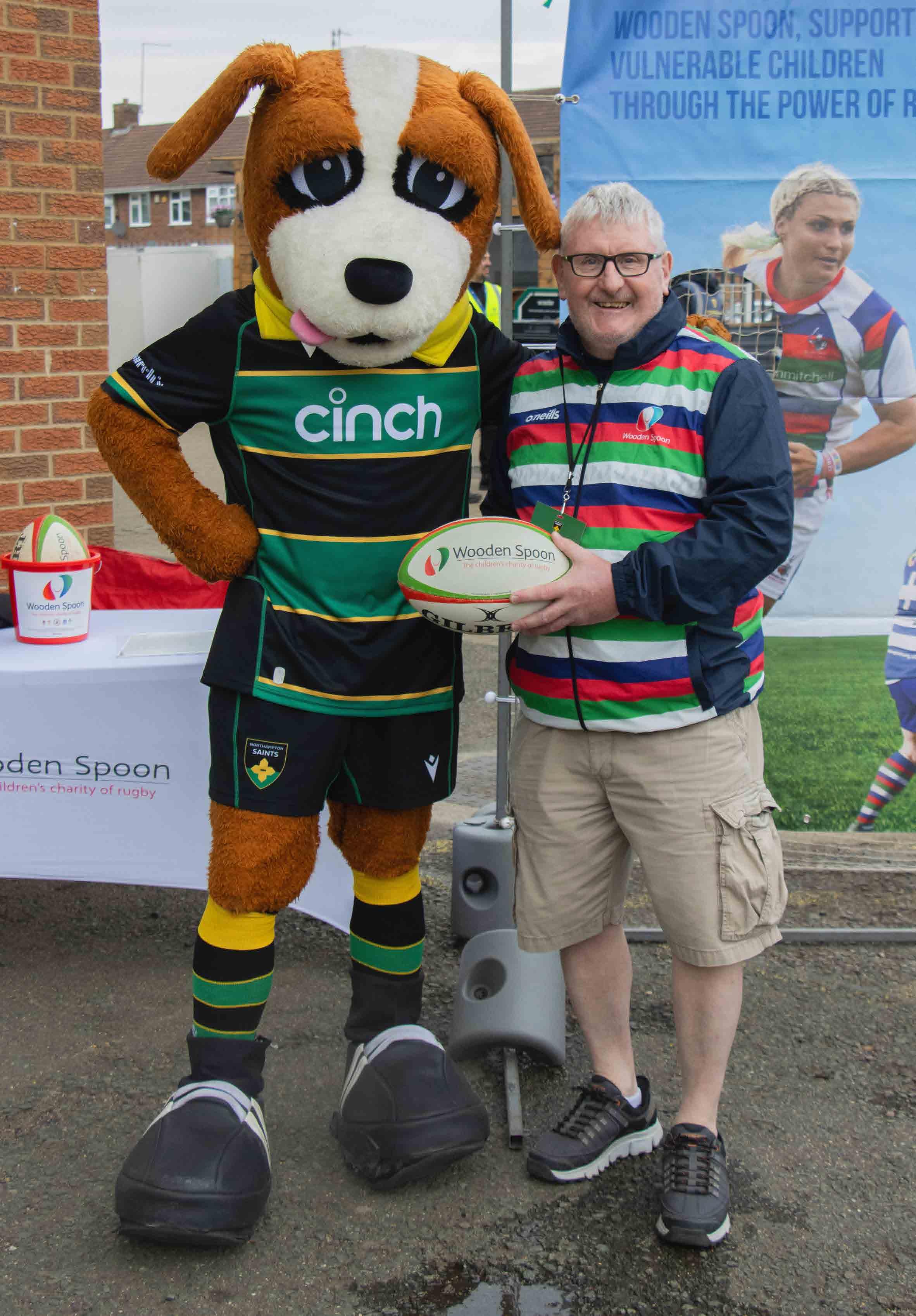
Wooden Spoon was established in 1983 and registered as a charity in England and Wales in October 1984 (Charity Registration 326691). In February 2008 Wooden Spoon also registered in Scotland (Charity Registration SC039247). It is a company limited by guarantee, registered in September 1984 in England and Wales number 01847860 and latest Articles of Association amended in October 2007.
The charity comprises of a Council of Trustees, a national office headed up by a Senior Management team based in Hampshire, 38 volunteer Regional Committees and a subscribing social membership of over 7,000. The charity has a 100% owned subsidiary company WSS Events Ltd.
Wooden Spoon is governed by its Articles of Association. These provide that the charity will be overseen by the Trustees who are both the only full members of the charity and its directors. Together, the Trustees comprise the Council.
New Trustees are appointed by the Council which seeks to ensure that there is a broad range of relevant skills, encouraging diversity whilst giving due consideration to the range of experience required. The Trustees serve a three year term but can be reappointed for up to a further two succeeding terms.
The Trustees provide their time at no charge to the charity. The charity has no share capital and hence the Trustees have no disclosable interests in the company. No dividends may be paid to any members. Trustees are provided with details of their responsibilities as charity Trustees upon their appointment and receive training in the role of Trustee as part of their induction. Trustees are encouraged to continue to attend training events to brief them on their legal and other obligations under charity and company law whilst also assisting them in their role as a Council member.
The Council of Trustees meets at least four times each year. It is responsible for the effective governance of the charity and for safeguarding the charity’s assets. The Trustees approve the commissioning of projects and the awarding of grants. In addition to sitting on the four sub-committees, Trustees are encouraged to help organise events, support the regions and attend project openings.
The Trustees who have served in the year and the Governance and Administrative information on page 53 form part of the Trustee Report.
In order to promote good governance and best practice, the Council of Trustees has four committees.
The Projects Grants Committee responsibilities are to review all the charity’s project proposals whether submitted by the regional committees or the national team, to ensure that the charity’s projects comply with its charitable purposes and to approve the projects that meet its criteria. In line with criteria, grants for projects are made to institutions or charities only and the senior management team carry out due diligence on each application prior to submission to the committee. Regional committees are involved in project nomination and review, the project grant is made from the charity but it will be denoted as a project from the Wooden Spoon region where the local fundraising took place. All Trustees receive advance copies of all the projects to be approved and are invited to join the monthly meetings. The committee has delegated powers to the Committee Chair and the Director of Projects & Systems for projects below an agreed level, however, all projects are considered at the monthly meeting and if appropriate full approval is given. On issue of the grant letter the charity is then committed to the project and it is identified as a liability.
The Governance Committee is responsible for ensuring that all matters of good governance and best business practice are effective throughout the entire charity, both at the national administrative office and in the Regions. The Committee maintains a risk register, reviews the execution of all delegated responsibilities with management and monitors the practical application of internal controls.
The Audit Committee is responsible for overseeing the charity’s preparation of annual accounts, considering reports from the auditor and advising the Council on financial control and accounting matters, in liaison with the Director of Finance & Operations.
The Investment Committee considers investment policy and considers the risk of investment of free cash resources in liaison with information from external advisors.
The Council of Trustees ensure that all activities are undertaken to further charitable purposes.
The key management personnel of the charity comprise of the Senior Management Team. The Chief Executive Officer is responsible to the Council of Trustees for the day to day running and execution of strategy and policy and is supported by the Director of Projects & Systems, the Director of Finance & Operations until December 2024 and the Director of Fundraising & Marketing. A Chief Operating Officer was appointing in January 2025 and takes up the position in April 2025.
The terms and pay of all staff is reviewed in April annually and recommendations are made to the Board. Pay for staff and reviews are benchmarked to similar organisations. The charity encourages fairness and respect, equal opportunity and ensures that everyone’s contribution is recognised and valued. It actively implements family friendly policies for its staff and encourages training and personal development.
The performance of the charity is measured by the Council against the approved annual budget on a quarterly basis.
The charity is very much a regional organisation in its method of operation. Currently there are 38 Regional Committees operating across the UK, including Wales as one region, 3 in Scotland, 1 in Northern Ireland and 33 in England. These are staffed entirely by volunteers (there are 260 volunteers recorded) who are drawn from its social members and led by a ‘Chair’ along with a committee formed of varying roles such as treasurer, projects lead, events officer, social media officer etc. The constitution of the Regional Committees is established by the Trustees and is set out in the charity’s Administration Manual. The national office communicates with the regions through the regional team offering timely support with admin, events and fundraising etc as well as offering central services support such as marketing & finance to ensure the smooth running of their regional activities. There is a ‘National Volunteers Conference’ annually which our committee members are invited to attend which is a key event for the charity to communicate and share our vision to our regions. Regular communications from our regional team out to our committee members via a monthly newsletter and monthly online Team Talk meetings.
Fundamental to the charity’s culture is that all funds raised in a particular Region are, to the extent possible, then invested in operational or capital projects in that Region; “local funds for local projects”. In addition,
national fundraising, is where possible, used to provide further support for projects in the Regions. Each region has a page on the main website detailing their events and projects and this is co-ordinated with our national calendar.
We acknowledge the tremendous dedication provided to the charity by all its volunteer supporters whose fundraising activities take place across much of the United Kingdom, in the Isle of Man, the Channel Islands and the Republic of Ireland.
The Trustees have considered the major risks to which the charity is exposed. The risk register, which includes strategic and operational risk, is reviewed and updated at quarterly Governance and Trustee meetings with appropriate actions identified. Specific areas of activity are reviewed on a monthly basis.
The financial year has seen activity increasing in all the fundraising areas, the considerable input made by our regional volunteers and the national fundraising team. As the pace of activity and support for these efforts increased a resource risk had been identified and put in place.
Throughout the year consideration has also been given to the longer term as the economic and fundraising environment changes and impacts our supporters.
In addition particular attention has been paid to the charity’s ability to continue to reach its beneficiaries. During the year the charitable grant giving activities increased from £1.3m to £1.5m and the grant process takes due care and consideration so the grants will benefit those most in need.
The Trustees are confident that reasonable systems have been established to manage and identify new and existing risks, steps are put in place to mitigate risks and with forward planning for the charity to be better prepared for future eventualities. These systems include monthly review of the financial results, diligent preparation and regular review of budget and regular reforecasting throughout the financial year.
Wooden Spoon is involved in funding and participating in numerous activities and projects involving children and vulnerable young adults. The charity considers the welfare of children and vulnerable young adults to be of the utmost importance. Wooden Spoon’s rules and procedures ensure that all staff and volunteers who may have contact with children and young adults are DBS checked, and this is recorded and monitored at the head office.
The Trustees confirm that they have complied with the duty in section 17 of the Charities Act 2011 to have due regard to public benefit guidance published by the charity Commission. The Annual Report highlights the significant activities undertaken to carry out our aims for the public benefit and our achievements measured against those aims.
Wooden Spoon has adopted the charity Governance Code and benchmarked the charity’s effectiveness against the seven principles that make up the Code. The Code’s principles have been revisited and reflected upon and where appropriate have led to new or updated policies. As an example of actively considering the Code the recent recruitment of a new Trustees carefully considered the need to secure a broader range of relevant skills and a more diverse board.
The charity’s staff continue to work closely with the Governance Committee to ensure the charity is compliant with the data protection legislation. The charity does not sell or give data to third parties.
All supporters and donors have been contacted to ensure they are happy to continue to receive updates and materials from us. There have been no breaches or complaints to report to the Information Commissioners Office.
The charity has built on fundraising income and generated an increase to £3,623,133 (2024: £3,366,877).
The charity’s fundraising levels as set out in the Operational Review on page 32. Head office costs were increased to £608,926 (2024: £566,308) as resource risk was identified and increased resources were needed to support all fundraising, on-going digital upgrade work and regional activity. The overall costs have reduced slightly to £1,655.691 (2024: £1,683,508).
£2,500
£2,000
Expenditure on charitable activities has increased in the year to £1,506,730 (2024: £1,314,360). The pace of grant giving has increased compared to the prior year and the commitment to grants made but not yet drawn is set out in the Note 12 to the Financial Statements which has reduced.
Wooden Spoon ended the year with an overall surplus of £460,712 (2024: £369,009). This surplus is added to brought forward reserves and will also enable significant charitable grant making in the year ahead.
The year has returned a full programme of social events and the regional engagement and the resourcefulness of our volunteers has seen a regional net income of over £1m. This has followed several years of reduced fundraising post pandemic and is a notable achievement. Our membership has shown a slight decline although there remains the opportunity to sign new members at the events.
The charity has set out its strategic aims for the next five years but will continue with a clear goal to further improve the margin on its total income through a combination of sensible investment in efficiencies and a focus on growing higher margin sources of revenue.
Wooden Spoon complies with the standards set in the Fundraising Regulator’s Code of Fundraising Practice and is also a member of the Institute of Fundraising. Wooden Spoon staff and volunteers carry out the charity’s fundraising activities and do not employ external agencies to carry out fundraising on its behalf. Our fundraising staff are aware of the need to be sensitive and careful when engaging with vulnerable people and if people do not want to give or wish to stop giving their decision is fully respected. Any complaints received are recorded and investigated. There have been no fundraising complaints recorded in the past year.
The Trustees and the Senior Management Team aim to ensure that Wooden Spoon’s fundraising is respectful, open, honest and accountable to the public. The charity considers the objects and the beneficiaries of the organisation when fundraising is planned.
The charity’s primary income sources in this financial year include:
Subscriptions: We enjoy the support of around 7,000 members who donate an annual subscription to the charity. This significant regular giving every year supports Wooden Spoon’s work and notably allowed sustainability. Members receive Spoonews (our in-house magazine) twice per year, invitations to regional and national events when staged, the opportunity to win national and international rugby tickets and the opportunity to wear the charity’s distinctive tie or broach in the colours of the England, Scotland, Wales and Ireland rugby teams.
Campaign and Donations: Donations have remained at a consistent level for several years and the generous support of major donors has allowed continued support of the charity’s work and project grant giving.
Legacy: The charity has received funds from legacies is supporters wills that amount to £59,000. (2024: Nil)
Major Gifts: Wooden Spoon has benefited from a number of major gifts this year from an individual supporter.
Events: The charity’s ability to stage events in the financial year has been without restrictions. The national team were able to support the London Marathon fundraising in April 2024 and an expanded Veterans Rugby Festival which including teams from across the regions, took place in September 2024. Fundraising has continued at a local level with regular golf days, cycle rides and individual pursuits. Events including sporting dinners and lunches, with the frequent help of high-profile members of the rugby community, have been taking place throughout the year and many regions held events around the men’s Rugby World Cup in the autumn and both men’s and women’s Six Nations events remaining very popular. Our objective is always to maximise the funds generated at each event and the vast majority of our events are run by the regional volunteer committees whose hard work and commitment are at the heart of the charity. Their enthusiasm and incredible efforts have contributed significantly and our regional fundraising is now over £1m.
Corporate Engagement: Our engagement continues with the corporate community.
Youngs Pubs have engaged in fundraising events for the year including multiple pub events and initiatives, Player at the Pump evenings and an on-going commitment to fundraise in the forthcoming year for which we are grateful.
We are enormously grateful to Rugbytots, Youngs Pubs, Omerta and all of the other corporate supporters and their employees and associates for their hard work and generosity.
Donated Goods and Services: The charity receives donations of services from both corporate supporters. We are very grateful to all donors and in particular to FedEx for providing their services on a pro bono basis.
The charity is fortunate to have incredible regular supporters and donors who have continued to donate despite all the economic pressures and disruption over the last few years.
The aim for the year has been to continue to build and focus the fundraising efforts achieved over the last few years and to accelerate our grant giving. A five year strategy plan has now been approved building the charity further forward.
Alongside this we had identified a need to enhance our support for our regions and volunteers and refresh our offering to rugby, communities and individual givers through our membership journey.
The Veterans Festival in September 2024 is now part of the annual calendar and has helped to introduce new volunteers and providing support to the regions who enter and fundraise for their teams. The incredible support of players, volunteers and regional input has been heartwarming, and the event goes from strength to strength with over £100k raised between regionally and nationally including shirt sponsorship.
Hybrid working continues and operational management of all areas of activity is carried out using remote IT services and video conferencing. The year has seen an upgrade in our customer relationship system and the external development team has worked with the Director of Projects & Systems to minimise any impact of the upgrade. Throughout the year all other IT services to the charity remained stable and all of the charity’s management and internal controls were maintained.
The charity has improved the office space available and our staff well-being remains of highest importance.
There are allocated team days and regular all-in team days to ensure teams are communicating. Meetings have taken place alongside continued provision of an employee counselling service.
The charity’s objective is to donate its surplus over the medium term, subject to maintaining reserves in accordance with good accounting and business practices.
The Council is aware of the Charity Commission’s guidance concerning reserves policies. The policy is reviewed on an annual basis and the Trustees updated the policy relating to unrestricted reserves to better reflect current best accounting practice, and to align the reserves policy more logically with the charity’s operations.
A significant part of the charity’s unrestricted reserves are generated through regional activities. The charity’s policy has always been, and continues to be, to release such funds where possible for grants to charitable projects in the financial year following that in which they were raised. The Trustees have previously considered that the reserve policy should explicitly recognise this practice and the reserve policy now sets a target level of free unrestricted reserves at the year-end date, of an amount equal to the unrestricted funds raised through the regional network in the year ending on that date.
The Trustees consider that this policy provides an amount of year end reserves of a scale which should permit the charity to continue its normal style of operation, whilst not being an excessive restriction on the swift deployment of charitable funds to public benefit.
Restricted Funds: The reserve covers all funds received by the charity for named specific purposes that have yet to be spent.
Unrestricted Funds: The reserve represents the funds available to the charity for investment in new charitable projects without restriction
The table shows the value of these reserves at the end of the financial year.
Free reserves which represent unrestricted reserves less fixed assets at the year-end total £2,779,233. The charity will utilise reserves in excess of its policy noted above in approving grants for projects in the year ahead.
The Trustees consider the financial position of the charity to be satisfactory and are of the view that the charity is financially secure and is a going concern
Free reserves represent funds available for the charity for commitment to new projects. The total amount of this reserve is £2,779,233. The Trustees have agreed that £2,440,081 will be allocated to projects in 39 different areas across the UK and Ireland. The amount of £339,152 is currently not allocated..
Auditor
Crowe U.K. LLP have indicated their willingness to continue in office.
In preparing this report, the directors have taken advantage of the small companies exemptions provided by section 415A of the Companies Act 2006.
The annual report has been approved by the Council of Trustees and signed on its behalf by:

Quentin Smith Chairman June
2025
The Trustees (who are also Directors of Wooden Spoon Society for the purposes of company law) are responsible for preparing the Trustees’ Annual Report and the financial statements in accordance with applicable law and United Kingdom Generally Accepted Accounting Practice (United Kingdom Accounting Standards).
Company law requires the Trustees to prepare financial statements for each financial year. Under company law the Trustees must not approve the financial statements unless they are satisfied that they give a true and fair view of the state of affairs of the charitable company and of the incoming resources and application of resources, including the income and expenditure, of the charitable company for that period. In preparing these financial statements, the Trustees are required to:
• select suitable accounting policies and then apply them consistently;
• observe the methods and principles in the Charities SORP;
• make judgments and estimates that are reasonable and prudent;
• state whether applicable UK accounting standards have been followed, subject to any material departures disclosed and explained in the financial statements; and
• prepare the financial statements on the going concern basis unless it is inappropriate to presume that the charitable company will continue in business.
The Trustees are responsible for keeping adequate accounting records that are sufficient to show and explain the charitable company’s transactions, disclose with reasonable accuracy at any time the financial position of the charitable company and enable them to ensure that the financial statements comply with the Companies Act 2006, the Charities and Trustee Investment (Scotland) Act 2005, the Charities Accounts (Scotland) Regulations 2006 (as amended) and the provisions of the charity’s constitution. They are also responsible for safeguarding the assets of the charitable company and hence for taking reasonable steps for the prevention and detection of fraud and other irregularities.
Insofar as each of the Trustees and Directors of the charity at the date of approval of this report is aware there is no relevant audit information (information needed by the charity’s auditor in connection with preparing the audit report) of which the charity’s auditor is unaware. Each Trustee/Director has taken all of the steps that he/she should have taken as a Trustee/ Director in order to make himself/herself aware of any relevant audit information and to establish that the charity’s auditor is aware of that information.
By order of the Council

Quentin Smith Chairman June 2025
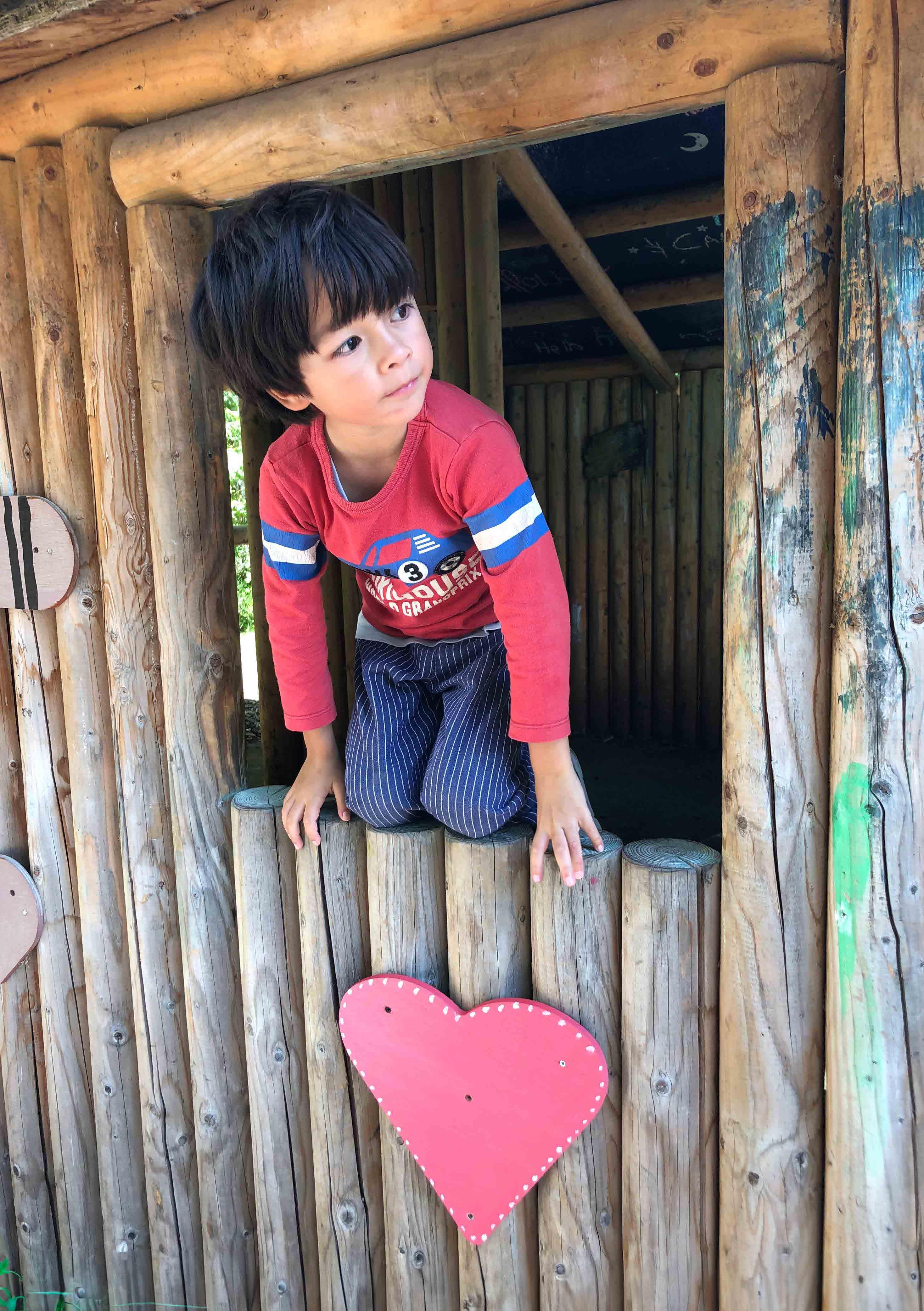
We have audited the financial statements of Wooden Spoon Society for the year ended 31 March 2025 which comprise the Statement of Financial Activities, Balance Sheet, Statement of Cash Flows and notes to the financial statements, including significant accounting policies. The financial reporting framework that has been applied in their preparation is applicable law and United Kingdom Accounting Standards, including Financial Reporting Standard 102 The Financial Reporting Standard applicable in the UK and Republic of Ireland (United Kingdom Generally Accepted Accounting Practice).
In our opinion the financial statements:
• give a true and fair view of the state of the charitable company’s affairs as at 31 March 2025 and of income and expenditure, for the year then ended;
• have been properly prepared in accordance with United Kingdom Generally Accepted Accounting Practice; and
• have been prepared in accordance with the requirements of the Companies Act 2006 and the Charities and Trustee Investments (Scotland) Act 2005 and Regulations 6 and 8 of the Charities Accounts (Scotland) Regulations 2006 (amended).
We conducted our audit in accordance with International Standards on Auditing (UK) (ISAs (UK)) and applicable law. Our responsibilities under those standards are further described in the Auditor’s responsibilities for the audit of the financial statements section of our report. We are independent of the charitable company in accordance with the ethical requirements that are relevant to our audit of the financial statements in the UK, including the FRC’s Ethical Standard, and we have fulfilled our other ethical responsibilities in accordance with these requirements. We believe that the audit evidence we have obtained is sufficient and appropriate to provide a basis for our opinion.
In auditing the financial statements, we have concluded that the Trustees’ use of the going concern basis of accounting in the preparation of the financial statements is appropriate.
Based on the work we have performed, we have not identified any material uncertainties relating to events or conditions that, individually or collectively, may cast significant doubt on the charitable company’s
ability to continue as a going concern for a period of at least twelve months from when the financial statements are authorised for issue.
Our responsibilities and the responsibilities of the Trustees with respect to going concern are described in the relevant sections of this report.
The Trustees are responsible for the other information contained within the annual report. The other information comprises the information included in the annual report, other than the financial statements and our auditor’s report thereon. Our opinion on the financial statements does not cover the other information and, except to the extent otherwise explicitly stated in our report, we do not express any form of assurance conclusion thereon.
Our responsibility is to read the other information and, in doing so, consider whether the other information is materially inconsistent with the financial statements or our knowledge obtained in the audit or otherwise appears to be materially misstated. If we identify such material inconsistencies or apparent material misstatements, we are required to determine whether this gives rise to a material misstatement in the financial statements themselves. If, based on the work we have performed, we conclude that there is a material misstatement of this other information, we are required to report that fact.
We have nothing to report in this regard.
Opinions on other matters prescribed by the Companies Act 2006
In our opinion based on the work undertaken in the course of our audit:
• the information given in the Trustees’ report, which includes the directors’ report prepared for the purposes of company law, for the financial year for which the financial statements are prepared is consistent with the financial statements; and
• the directors’ report included within the Trustees’ report have been prepared in accordance with applicable legal requirements.
Matters on which we are required to report by exception
In light of the knowledge and understanding of the charitable company and their environment obtained in the course of the audit, we have not identified material misstatements in the directors’ report included within the Trustees’ report.
We have nothing to report in respect of the following matters in relation to which the Companies Act 2006 and the Charities Accounts (Scotland) Regulations 2006 requires us to report to you if, in our opinion:
• adequate and proper accounting records have not been kept; or
• the financial statements are not in agreement with the accounting records and returns; or
• certain disclosures of Trustees’ remuneration specified by law are not made; or
• we have not received all the information and explanations we require for our audit.
As explained more fully in the Trustees’ responsibilities statement set out on page 29, the Trustees (who are also the directors of the charitable company for the purposes of company law) are responsible for the preparation of the financial statements and for being satisfied that they give a true and fair view, and for such internal control as the Trustees determine is necessary to enable the preparation of financial statements that are free from material misstatement, whether due to fraud or error.
In preparing the financial statements, the Trustees are responsible for assessing the charitable company’s ability to continue as a going concern, disclosing, as applicable, matters related to going concern and using the going concern basis of accounting unless the Trustees either intend to liquidate the charitable company or to cease operations, or have no realistic alternative but to do so.
We have been appointed as auditor under section 44(1) (c) of the Charities and Trustee Investment (Scotland) Act 2005 and under the Companies Act 2006 and report in accordance with the Acts and relevant regulations made or having effect thereunder.
Our objectives are to obtain reasonable assurance about whether the financial statements as a whole are free from material misstatement, whether due to fraud or error, and to issue an auditor’s report that includes our opinion. Reasonable assurance is a high level of assurance, but is not a guarantee that an audit conducted in accordance with ISAs (UK) will always detect a material misstatement when it exists. Misstatements can arise from fraud or error and are considered material if, individually or in the aggregate, they could reasonably be expected to influence the economic decisions of users taken on the basis of these financial statements.
Details of the extent to which the audit was considered capable of detecting irregularities, including fraud and non-compliance with laws and regulations are set out below.
A further description of our responsibilities for the audit of the financial statements is located on the Financial Reporting Council’s website at: www.frc.org.uk/auditorsresponsibilities
This description forms part of our auditor’s report.
Extent to which the audit was considered capable of detecting irregularities, including fraud
Irregularities, including fraud, are instances of noncompliance with laws and regulations. We identified and assessed the risks of material misstatement of the financial statements from irregularities, whether due to fraud or error, and discussed these between our audit team members. We then designed and performed audit procedures responsive to those risks, including obtaining audit evidence sufficient and appropriate to provide a basis for our opinion.
We obtained an understanding of the legal and regulatory frameworks within which the charitable company operates, focusing on those laws and regulations that have a direct effect on the determination of material amounts and disclosures in the financial statements. The laws and regulations we considered in this context were the Companies Act 2006, the Charities Act 2011 and the Charities and Trustee Investment (Scotland) Act 2005, together with the Charities SORP (FRS 102). We assessed the required compliance with these laws and regulations as part of our audit procedures on the related financial statement items.
In addition, we considered provisions of other laws and regulations that do not have a direct effect on the financial statements but compliance with which might be fundamental to the charitable company’s ability to operate or to avoid a material penalty. We also considered the opportunities and incentives that may exist within the charitable company for fraud.
Auditing standards limit the required audit procedures to identify non-compliance with these laws and regulations to enquiry of the Trustees and other management and inspection of regulatory and legal correspondence, if any.
We identified the greatest risk of material impact on the financial statements from irregularities, including fraud, to be within the accuracy of legacy income and the override of controls by management. Our audit procedures to respond to these risks included enquiries of management about their own identification and assessment of the risks of irregularities, designing audit procedures over legacy income, sample testing on the posting of journals, reviewing accounting estimates for biases and reading minutes of meetings of those charged with governance.
Owing to the inherent limitations of an audit, there is an unavoidable risk that we may not have detected some material misstatements in the financial statements, even though we have properly planned and performed our audit in accordance with auditing standards. For example, the further removed non-compliance with laws and regulations (irregularities) is from the events and transactions reflected in the financial statements, the less likely the inherently limited procedures required by auditing standards would identify it. In addition, as with any audit, there remained a higher risk of non-detection of irregularities, as these may involve collusion, forgery, intentional omissions, misrepresentations, or the override of internal controls. We are not responsible for preventing non-compliance and cannot be expected to detect non-compliance with all laws and regulations.

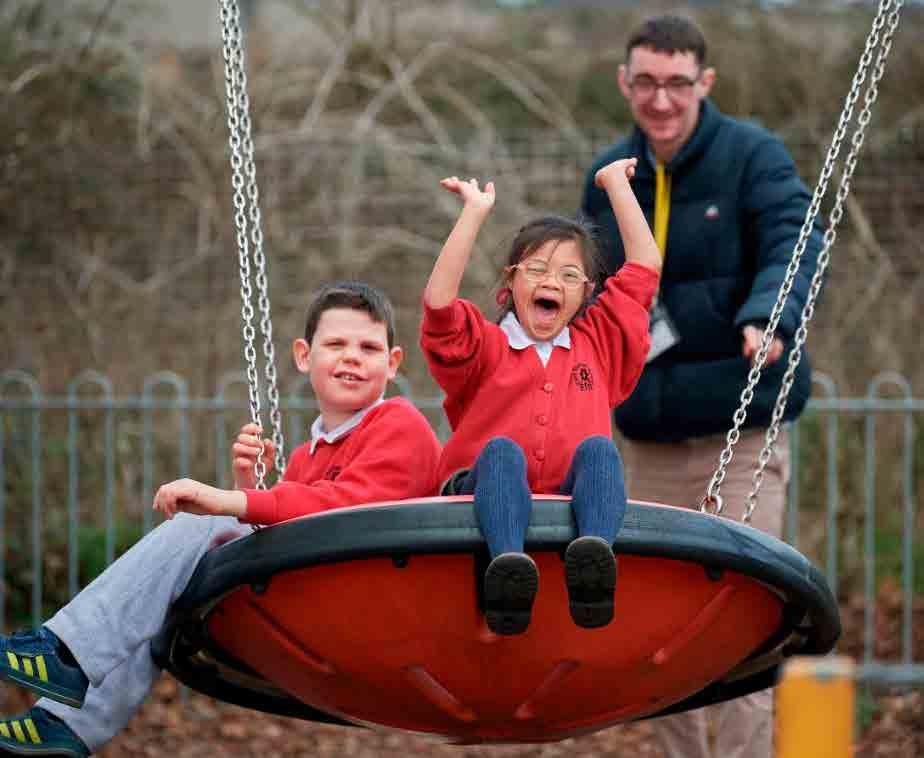
This report is made solely to the charitable company’s members, as a body, in accordance with Chapter 3 of Part 16 of the Companies Act 2006 and to the charitable company’s Trustees, as a body, in accordance with Regulation 10 of the Charities Accounts (Scotland) Regulations 2006. Our audit work has been undertaken so that we might state to the charitable company’s members those matters we are required to state to them in an auditor’s report and for no other purpose. To the fullest extent permitted by law, we do not accept or assume responsibility to anyone other than the charitable company and the charitable company’s members as a body, for our audit work, for this report, or for the opinions we have formed.

Guy Biggin, Senior Statutory Auditor, for and on behalf of Crowe U.K. LLP
Statutory Auditor 4th Floor, St James House, St James Square, Cheltenham, Gloucestershire, GL50 3PR
Date: 03 July 2025
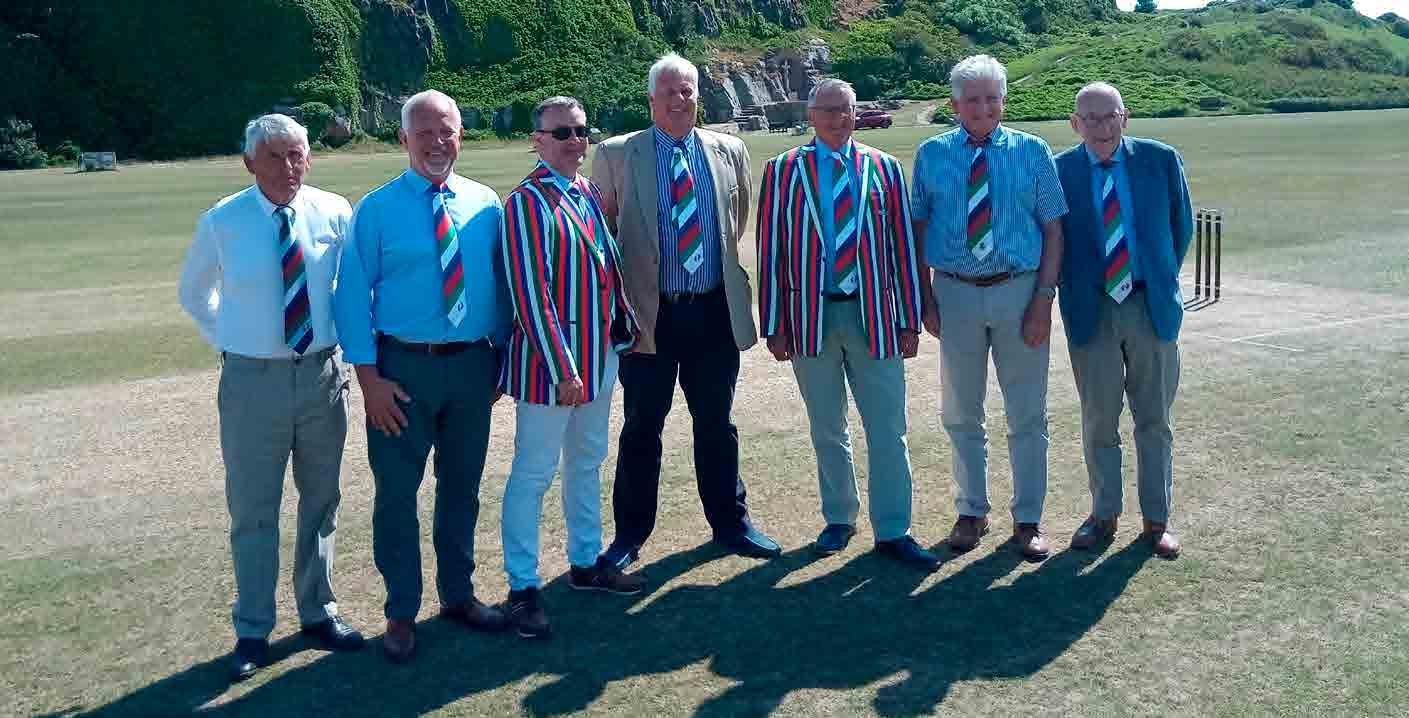

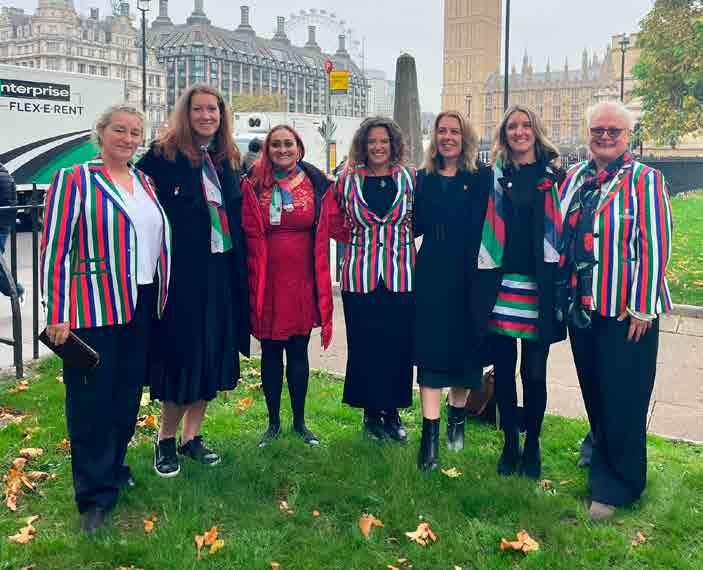
Including Income and Expenditure Account for the year ended 31 March 2025
The notes on pages 44 to 52 form part of these financial statements.
These accounts are prepared in accordance with the special provisions of Part 15 of the Companies Act relating to small companies and constitute the annual accounts required by the Companies Act 2006 and are for circulation to members of the company.
The financial statements on pages 1 to 56 were authorised and approved by the Council on June 2025 and were signed on its behalf by:

Quentin Smith Chairman
For the year ended 31 March 2025
The charity is a private company limited by guarantee (company no. 01847860) and a registered charity in England and Wales (charity no. 326691), and in Scotland (Scottish registered charity no. SC039247) which is incorporated and domiciled in the UK. The address of the registered office is Sentinel House, Harvest Crescent, Fleet, England, GU51 2UZ.
Basis of preparation
The financial statements have been prepared in accordance with Accounting and Reporting by Charities: Statement of Recommended Practice applicable to charities preparing their accounts in accordance with the Financial Reporting Standard applicable in the UK and Republic of Ireland (FRS 102) (effective 1 January 2019) – (Charities SORP (FRS 102)), the Financial Reporting Standard applicable in the UK and Republic of Ireland (FRS 102), the Charities Accounts (Scotland) Regulation 2006 and the Companies Act 2006.
Wooden Spoon Society meets the definition of a public benefit entity under FRS 102. Assets and liabilities are initially recognised at historical cost or transaction value unless otherwise stated in the relevant accounting policy note(s).
Preparation of the accounts on a going concern basis
The charity reported a cash inflow of £38,071 from operating activities for the year. The charity has continued project grant commitments and these are recognised at the time that Trustees agree the support. The Trustees are of the view that the charity is financially secure and that on this basis the charity is a going concern. The Trustees confirmed the adverse impact of the Covid-19 epidemic in the last few years is concluded. In particular they have noted the level of free reserves carried forward will be continually monitored to ensure that the future awarding of project grants takes into account the financial position of the charity and the charity is responding to current situations promptly.
The charity has a wholly owned subsidiary WSS Events Ltd. The financial statements to 31 March 2024 and 2023 have been prepared as a single entity as the subsidiary has been dormant.
Income is recognised when the charity has entitlement to the funds, any performance conditions attached to the item(s) of income have been met and it is probable the income will be received and the amount can be measured reliably.
Income comprises membership, donations, income receivable from events held during the year and interest receivable. Donations are recognised when received and comprise amounts received which are not connected to fundraising events. All other income is accounted for on a receivable basis. Income principally arises within the United Kingdom. Related gift aid is recognised when a donation is received.
Legacy entitlement is taken as the earlier of the date on which either: the charity is aware that probate has been granted, the estate has been finalised and notification has been made by the executor(s) to the Trust that a distribution will be made, or when a distribution is received from the estate. Receipt of a legacy, in whole or in part, is only considered probable when the amount can be measured reliably and the charity has been notified of the executor’s intention to make a distribution.
Income from grants, including government grants, whether ‘capital’ grants or ‘revenue’ grants, is recognised when the charity has entitlement to the funds, any performance conditions attached to the grants have been met, it is probable that the income will be received and the amount can be measured reliably and is not deferred
Donated services and facilities
Donated professional services and donated facilities are recognised as income when the charity has control over the item, any conditions associated with the donated item have been met, the receipt of economic benefit from the use by the charity of the item is probable and that economic benefit can be measured reliably. In accordance with the Charities SORP (FRS 102), the general volunteer time of the supporter is not recognised. Please refer to the Trustees’ annual report for more information.
Donated professional services and donated facilities are valued on the basis of the amount the charity would have been willing to pay to obtain the services on the open market; a corresponding amount is then recognised as expenditure in the same period.
Interest on funds held on deposit is included when receivable and the amount can be measured reliably by the charity; this is normally upon notification of the interest paid or payable by the Bank.
Restricted funds are those funds which are to be used in accordance with specific restrictions imposed by donors or which have been raised by the charity for a particular purpose. The details of which are set out in the notes to the accounts.
Unrestricted funds comprise accumulated surpluses and deficits on general funds. They are available for use at the discretion of the Council in furtherance of the objectives of the charity.
Charitable activities comprise grants and donations paid or committed to charitable projects. Committed charitable expenditure shown in note 11 represents the total value of the charitable projects for which approval has been granted. Payment of funds to the beneficiary organisation is contingent on specific performance criteria being met. When grant applications are approved by the Trustees the grant and a grant letter is issued to a beneficiary organisation and the charity recognises a liability for the amount approved as based on experience it is more probable than not the grants will be paid.
Fundraising and costs of fund raising include the expenses of fundraising events, promotional activities, staff and other costs directly involved in the relevant activity. Membership and donations costs are covered by staff costs involved in the operation of the Charity.
All expenditure is included on an accruals basis and is recognised when there is a legal or constructive obligation to pay. Costs have been attributed to one of the financial categories of expenditure in the Statement of Financial Activities (SOFA).
Governance costs relate to the compliance with constitutional and statutory requirements and included within support costs.
Where costs cannot be directly attributed to a particular heading, they have been apportioned to each functional category of expenditure. The allocation is based on several criteria including an assessment of time spent.
Pension contributions are made to either the employees’ group arranged Auto Enrolment scheme, the staff members own pension scheme or cash for the employee to make their own pension contributions. The amount charged to the Statement of Financial Activities in respect of pension costs is the contributions payable in the year. Differences between contributions payable in the year and contributions actually paid are shown as either accruals or prepayments in the balance sheet.
Tangible fixed assets are stated at cost, net of depreciation and any provision for impairment. Depreciation is provided on all tangible fixed assets at rates calculated to write off the cost of each asset to its estimated residual value on a straight line basis over its expected useful life, as follows:-
Other equipment
Computer equipment
33 1/3%
33 1/3%
Assets costing less than £500 are not capitalised.
Fixed asset investments are stated at cost. Provision is made for any impairment in the value of fixed asset investments.
All irrecoverable VAT on revenue costs is charged to the statement of financial activities.
Trade debtors, other debtors and accrued income are recognised at the settlement amount. Prepayments are valued at the amount prepaid net of any discount.
Creditors are recognised when the charity has a present obligation resulting from a past event that will probably result in the transfer of funds to a third party and measured or estimated reliably. Creditors are normally recognised at their settlement amount after any trade discounts are due.
Cash and cash equivalents
Cash is represented by cash in hand and immediately accessible deposits with financial institutions.
Taxation
The company is a registered charity, and as such is entitled to tax exemptions on all its income and gains properly applied for its charitable purposes.
Financial instruments
Financial assets and liabilities are measured at settlement value.
Critical accounting judgements and key sources of estimation uncertainty
In the application of the charity’s accounting policies, which are described above, Trustees are required to make judgements, estimates, and assumptions about the carrying values of assets and liabilities that are not readily apparent from other sources. The estimates and underlying assumptions are based on historical experience and other factors that are considered to be relevant.
• Depreciation – The charity depreciates its assets at rates calculated to write off the cost on a straight-line basis over the expected useful economic lives.
• Impairment of debtors – The charity makes an estimate of trade debtors and other debtors. When assessing the impairment of trade debtors and other debtors, management considers factors including the credit rating of the debtor, the ageing profile of debtors and historical experience.
for the year ended 31 March 2025
Detailed below is the breakdown of the Income and Expenditure expended by the charity in the various areas of operation. Further breakdown of the staff and support costs, with the allocation to different activities is detailed in the subsequent pages.
All grants have been made to institutions.
Significant grants made in the year are set out below:
Dogs for Good
The Nurture Project Northumberland
Park Community Academy Lancashire
Saltersgate School Edinburgh
Whitecote Primary School Yorkshire
Haberton School Ulster
Cancer Focus NI Ulsyrt
Maddys Mark
Pass the Plate
The Wave Project 4 locations
£35,000 Health and Wellbeing
£29,985 Sensory Rooms and Gardens
£25,000 Playgrounds and Outdoor Activities
£40,000 Specialist Equipment and Facilities
£25,000 Specialist Equipment and Facilities
£26,000 Sensory Rooms and Gardens
£40,000 Specialist Equipment and Facilities
£35,000 Health and Wellbeing
£34,000 Health and Wellbeing
£45,000 Health and Wellbeing/Specialist Equipment
The total employee benefits of the key personnel of the charity were £254,713 (2024: £281,875). During 2025 the key personnel included the Chief Executive Officer, the Director of Projects and Systems, Director of Finance and Operations and the Director of Fundraising and Marketing.
No Trustee received any emoluments during the year ended 31 March 2025 (2024: £nil). During the year expenses totalling £841 were incurred by 4 Trustees (2024: £2,915 incurred by 3 Trustees) which mainly relate to travel.
The charity provides a contribution to the pension schemes of all staff. In the current financial year £23,309 has been paid (2024: £23,583).
No staff were made redundant in the year (2024: £10,717 one member of staff).
Support costs incurred in the operation of the charity are detailed above. These costs are apportioned to each category of expenditure. The apportionment is based on the people committed to delivering the income related to these categories.
FedEx provide delivery services on a pro bono basis and the market value of these services is included above and has also been included in income to recognise these services were kindly donated free of charge.
No legal and professional costs were incurred in connection with Governance matters during the year.
The Society has an investment of £2 being the share capital of WSS Events Ltd. The investment represents 100% of the ordinary share capital of WSS Events Limited (a company registered in England and Wales) comprising two ordinary shares of £1 each. WSS Events Ltd has been dormant since March 2021.
The charity invested the CCLA Ethical Fund in 2024 and a further investment has been made during the year of the income received.
In previous years the charity received a donation of shares in Esher rugby club and a Class A Debenture in Murrayfield (Scottish Rugby) which will expire in 2045. These assets are recorded as an investment at a notional value of £1 each.
Deferred income has arisen as there are events which are taking place in the financial year to 31 March 2025 for which some revenue has been received in the current year.
During the year the charity has granted restricted donations where the funds have been applied to the specific requirements of the donor or their representatives. Note
This represents the amount available to be donated or expended at the discretion of the Trustees, for purposes consistent with the charity’s charitable aims.

Donations in kind are included in income when the benefit to the charity is reasonably quantifiable and measurable. They are valued by the Trustees at the amount the charity would have been willing to pay for the goods or services on the open market.
The donations in kind received in the year recognised in the statement of financial activities within donations totalled £5,428 (2024: £5,008).
These represented postal delivery services of £5,428 (2024: £5,008) included in the Cost of Raising Funds.
Donations in kind of time and services given to the charity by all its volunteers and supporters are of great value. As the value of these services is not capable of quantification with reasonable certainty, no amounts have been included in the financial statements for these valuable contributions.
The charity is extremely grateful for the support it receives from its numerous unpaid volunteers and other supporters.
Grants made by the charity are payments to third parties in the furtherance of the charitable objects of the charity. In the case of a grant offer being made this is accrued once the recipient has been notified of the grant award and a grant letter issued. The notifications give the recipient a reasonable expectation that they will receive the grant. Grants awards that are subject to the recipient fulfilling performance conditions are only accrued when the recipient has been notified of the grant and any remaining unfulfilled condition attaching to that grant is outside of the control of the benefitting charity.
The charity is a company limited by guarantee and has no share capital. The liability of each member in the event of a winding-up is limited to £1.
Trustees are deemed related parties to the charity and as such reporting of donations made directly to the charity is required. The Trustees are volunteers and donate their time at no cost to the charity. There were no donations from Trustees. (2024: Nil).

Patrons
Her Royal Highness,
The Princess Royal KG, KT, GCVO, CD, QSO
The Rugby Football Union
The Scottish Rugby Union
The Welsh Rugby Union
The Irish Rugby Football Union
Life President
Peter Scott
President Nigel Timson
Trustees
Adrian Alli
Ali Gilbert
Becca Brackwell-Slade (Resigned 22nd January 2025)
Brett Bader
Christine Braithwaite
Graham Allen (Resigned 14th September 2024)
Jane Harwood
Joanna Coombs
John Gibson
Mark McCafferty
Quentin Smith
Rufus Hack
Sarah Wight
Victoria Sparkes
Company Secretary Barry Monahan
Registered Office
Sentinel House
Ancells Business Park
Harvest Crescent Fleet
Hampshire GU51 2UZ
Independent Auditor
Crowe U.K. LLP
4th Floor
St James House
St James Square
Cheltenham
Gloucestershire GL50 3PR
Principle Bankers
Barclays Bank PLC
Town Gate House
Church Street East
Woking
Surrey GU21 6AE
Solicitors
Clifford Chance LLP
10 Upper Bank Street
London E14 5JJ
Wooden Spoon thanks our volunteers, supporters and the rugby community who all work with us to help vulnerable children and young people in the UK and Ireland.
Here are just some of them:
Our regional volunteers
Our corporate supporters
Our major donors
Our individual supporters
Our challengers and fundraisers
Our partners including the British Lions Charitable Trust
